|
|
|
|
Quotes selected by the staff of the Poison Pie Publishing House
|
|
Beginning in January 2013, the staff at the Poison Pie Publishing House
decided to post at irregular and unpredictable intervals quotes and thoughts from artists of all stripes,
with an open invitation to visitors to the site to spend some few moments in consideration. These quotes are collected here.
|
|
June 28, 2025
Barre Phillips (October 27, 1934 - December 28, 2024)
 |
| photo credit: Elmar Petzold, Bochum, 2019. |
We had an itch to listen to Journal Violone again this morning. While doing so, we wondered if Barre Phillips was still alive. A quick search revealed that he had died at the end of last year. We read a couple obituaries, which we appreciated very much. We reproduce two fragments below. The first is a reflection by John Fordham from his obituary in the Guardian. The second is a quote by Phillips from a 1970 interview with Richard Williams, recollected in his obituary published on his blog, "The Blue Moment".
[H]earing Phillips' originality brought realisations that had never occurred to me before.
Most notable was the insistence that an audience's attention could be gripped simply by whatever next unexpected thought entered an improviser's head — and could maybe even be held on to for an entire concert-length solo show — by those with the technical resourcefulness and imaginative sweep to do it.*
"I'm interested in the process of making music," he said. "I'm not really interested in the product at all, because I've got enough confidence to know that if I'm into it the product is really going to be OK anyway. That's my personal reason — to have something to communicate to an audience besides the product. If I can show my process to people, perhaps they can understand themselves a lot better."†
*Barre Phillips Obituary, John Fordham, The Guardian, January 14, 2025, full text.
†Barre Phillips 1934-2024, Richard Williams, The Blue Moment, January 1, 2025, full text.
|

February 7, 2025
Susan Alcorn (April 4, 1953 - January 31, 2025)
Susan Alcorn, who ushered the pedal steel guitar into the realm of free improvisation, died on Friday, January 31, 2025 at the age of 71. She was still actively making music, releasing several albums in 2024, including one on the PPPH Top Ten List for 2024.
We interviewed Susan Alcorn in 2017. We reproduce a quote below.
DK: Do you have a philosophy or some way of
looking at life that you would be willing to share?
SA: My philosophy of life is not really different than that
of most people. On my better days, I hope that I am
kind, compassionate, and loving; respectful of the
world around me. In life I've always tried to follow
my muse wherever it takes me and try to be real
with myself in that context.
--Susan Alcorn, You Haven't Seen Everything Until You've Seen a Woman Playing Pedal Steel Guitar: An Interview with Susan Alcorn, An International Journal of Exploratory Meta-Living, #11, 2017, full text.
|

January 2, 2025
Henry Dagg & Evan Parker
Today we feature an excerpt from the liner notes to the album, Then Through Now by Henry Dagg & Evan Parker. The liner notes take the form of a conversation between the two musicians and Karen Christopher.
Henry: It's a bit like a trip through the forest, you're very unlikely to follow the same route twice, and there will always be unexpected things happening, things you didn't quite intend to happen, that either turned out terrible or far better than you could have imagined.
Evan: That's exactly the way my thing works, I'm trying to do something and then something better happens. It's a cliché to say, well, if you make a mistake, do it two or three more times, it will sound like part of the piece.
—Henry Dagg & Evan Parker, from the liner notes to the album Then Through Now performed by Henry Dagg & Evan Parker, False Walls, Faversham, Kent, United Kingdom, 2022.
|
|
May 5, 2024
Keiji Haino (b. May 3, 1952)
 Today we feature the lyrics to a song by Keiji Haino, Japanese experimental musician and vocalist. As an aside, we used this quote as the epigraph to A Practicum on Divination via Cleromancy, written by Hebeloma Crustuliniforme from January through December, 2019, and serially published by the Poison Pie Publishing House of Knoxville, Tennessee on a daily basis in 2021.
Today we feature the lyrics to a song by Keiji Haino, Japanese experimental musician and vocalist. As an aside, we used this quote as the epigraph to A Practicum on Divination via Cleromancy, written by Hebeloma Crustuliniforme from January through December, 2019, and serially published by the Poison Pie Publishing House of Knoxville, Tennessee on a daily basis in 2021.
To those awakened and directionless
wandering toward yonder abyss
I say “not that way”
—Keiji Haino, from the lyrics to the untitled first track on the album Pathétique performed by Fushitsusha, English translation by Alan Cummings, PSF Records, Tokyo, 1994.
|
|
April 28, 2024
Pär Lagerkvist (May 23, 1891 - July 11, 1974)
 Today we feature a poem from the Swedish author, Pär Lagerkvist. As an aside, this poem was used as the epigraph for the poem, A Prayer for Disquiet, collected in A Prayer Book for the Damned, written by David J. Keffer in Knoxville, Tennessee from August to October, 2014 and published by the Poison Pie Publishing House in July, 2015.
Today we feature a poem from the Swedish author, Pär Lagerkvist. As an aside, this poem was used as the epigraph for the poem, A Prayer for Disquiet, collected in A Prayer Book for the Damned, written by David J. Keffer in Knoxville, Tennessee from August to October, 2014 and published by the Poison Pie Publishing House in July, 2015.
The Dead One (Den Döde)
All is there, only I am no more,
all is still there, the fragrance of rain in the grass,
as I remember it, and the sough of the wind in the trees,
the flight of the clouds and the disquiet of the human heart.
Only my heart’s disquiet is no longer there.
--Pär Lagerkvist, from Evening Land (Aftonland), translated by W.H. Auden and Leif Sjöberg, Wayne State University Press, Detroit, Michigan, 1975, p. 51.
|
|
April 21, 2024
Donald Barthelme (April 7, 1931 - July 23, 1989)
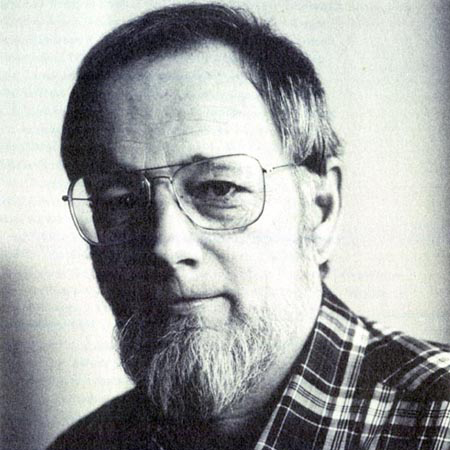 Today we feature a quote from the American post-modern writer, Donald Barthelme. As an aside, this quote was used as the epigraph for Perhaps, the continuing exploits of Alton & Eugenia, written by David J. Keffer in Knoxville, Tennessee from September, 1999 to July, 2000, and published by the Poison Pie Publishing House of Knoxville, Tennessee in April, 2013.
Today we feature a quote from the American post-modern writer, Donald Barthelme. As an aside, this quote was used as the epigraph for Perhaps, the continuing exploits of Alton & Eugenia, written by David J. Keffer in Knoxville, Tennessee from September, 1999 to July, 2000, and published by the Poison Pie Publishing House of Knoxville, Tennessee in April, 2013.
The Balloon of Perhaps. My best balloon.
—Donald Barthelme, from The Great Hug collected in Amateurs, Farrar, Straus and Giroux, New York, 1976, p. 48.
|
|
April 14, 2024
Donald Justice (August 12, 1925 - August 6, 2004)
 Today we feature an interior fragment of a poem, which we have liked for many years, by the American poet and educator, Donald Justice. This four-line fragment was used as the epigraph to the novel, I Saw Blood and then Everything Went Black, sixteen dark fables from the future, written by David J. Keffer in Minneapolis, Minnesota from sometime in 1992 to March, 1993, and published by the Poison Pie Publishing House of Knoxville, Tennessee in December, 2012.
Today we feature an interior fragment of a poem, which we have liked for many years, by the American poet and educator, Donald Justice. This four-line fragment was used as the epigraph to the novel, I Saw Blood and then Everything Went Black, sixteen dark fables from the future, written by David J. Keffer in Minneapolis, Minnesota from sometime in 1992 to March, 1993, and published by the Poison Pie Publishing House of Knoxville, Tennessee in December, 2012.
Night is the sky over this poem.
It is too black for stars.
And do not look for any illumination.
You neither can nor should understand what it means.
Donald Justice, from Poem originally published in Departures, Atheneum, 1973, and later collected in New and Selected Poems, Alfred A. Knopf, New York, 1995, p. 106;
full text archived at the Poetry Foundation.
|
|
April 7, 2024
Paal-Helge Haugen (b. April 26, 1945)
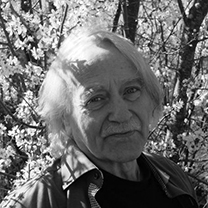 Today we feature a poem by the Norwegian writer, Paal-Helge Haugen. As an aside, this quote was used as the epigraph for A Memory of Fire, a novel of indeterminate conflagrations, written by David J. Keffer in Washington, D.C. from April to December, 1997, and published by the Poison Pie Publishing House of Knoxville, Tennessee in March, 2013.
Today we feature a poem by the Norwegian writer, Paal-Helge Haugen. As an aside, this quote was used as the epigraph for A Memory of Fire, a novel of indeterminate conflagrations, written by David J. Keffer in Washington, D.C. from April to December, 1997, and published by the Poison Pie Publishing House of Knoxville, Tennessee in March, 2013.
Elementary Geography
I don't know any shortcuts
Roads are crooked, overgrown
suddenly icy, with soft shoulders.
Most of them aren't on the map.
--Paal-Helge Haugen, from Wintering with the Light, translated from the Norwegian by Roger Greenwald, Sun & Moon Press, Los Angeles, California, 1997, p. 43.
|
|
March 31, 2024
Charles Darwin (February 12, 1809 - April 19, 1882)
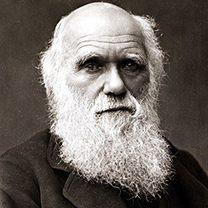 Today we feature a quote from the English naturalist and biologist, Charles Darwin. As an aside, a different quote from On the Origin of Species was used as the epigraph to each odd-numbered chapter from one to nineteen in the novel, The Augur in the Arbor Inn, a tautological myth of evolution, written by David J. Keffer in Knoxville, Tennessee from December, 2014 to July, 2015. This novel remains unpublished.
Today we feature a quote from the English naturalist and biologist, Charles Darwin. As an aside, a different quote from On the Origin of Species was used as the epigraph to each odd-numbered chapter from one to nineteen in the novel, The Augur in the Arbor Inn, a tautological myth of evolution, written by David J. Keffer in Knoxville, Tennessee from December, 2014 to July, 2015. This novel remains unpublished.
More individuals are born than can possibly survive. A grain
in the balance will determine which individual shall live and
which shall die,—which variety or species shall increase in
number, and which shall decrease, or finally become extinct...
The slightest advantage in one being, at any age or during any
season, over those with which it comes into competition, or
better adaptation in however slight a degree to the surrounding
physical conditions, will turn the balance.
--Charles Darwin, On the Origin of Species by Means of Natural Selection, or, The Preservation of Favoured Races in the Struggle for Life, John Murray, London, 1859.
|
|
March 24, 2024
Jorge Luis Borges (August 24, 1899 - June 14, 1986)
 Today we feature a quote from the Argentinian writer and scholar, Jorge Luis Borges. As an aside, this quote was used as the epigraph for The Portable Library of Hong Samud, a novel that grew as a vine grows, guided by an innate, phototactic sensitivity, transcribed by David J. Keffer in Knoxville, Tennessee from August, 2015 to December, 2015, and published by the Poison Pie Publishing House of Knoxville, Tennessee in March, 2020.
Today we feature a quote from the Argentinian writer and scholar, Jorge Luis Borges. As an aside, this quote was used as the epigraph for The Portable Library of Hong Samud, a novel that grew as a vine grows, guided by an innate, phototactic sensitivity, transcribed by David J. Keffer in Knoxville, Tennessee from August, 2015 to December, 2015, and published by the Poison Pie Publishing House of Knoxville, Tennessee in March, 2020.
I have squandered and consumed my years in adventures of this type. To me, it does not seem unlikely that on some shelf of the universe there lies a total book. I pray the unknown gods that some man—even if only one man, and though it may have been thousands of years ago!—may have examined and read it. If honour and wisdom and happiness are not for me, let them be for others. May heaven exist, though my place be in hell. Let me be outraged and annihilated, but may Thy enormous Library be justified, for one instant, in one being.
--Jorge Luis Borges, from the “The Library of Babel” (1941), collected in Fictions, translated by Anthony Kerrigan, John Calder Publishers Ltd, London, 1965, p. 78.
|
|
March 17, 2024
Pär Lagerkvist (May 23, 1891 - July 11, 1974)
 Today we feature an untitled poem from the Swedish author and Nobel Laureate, Pär Lagerkvist. As an aside, this poem was used as the epigraph for Owen & Dolores, a sketch, written by David J. Keffer in Knoxville, Tennessee from September to December, 2000, and deemed unpublishable by the Poison Pie Publishing House of Knoxville, Tennessee in September, 2016.
Today we feature an untitled poem from the Swedish author and Nobel Laureate, Pär Lagerkvist. As an aside, this poem was used as the epigraph for Owen & Dolores, a sketch, written by David J. Keffer in Knoxville, Tennessee from September to December, 2000, and deemed unpublishable by the Poison Pie Publishing House of Knoxville, Tennessee in September, 2016.
Some day you will be one of those who lived long ago.
The earth will remember you, just as it remembers the grass
and the forests,
the rotting leaves.
Just as the soil remembers,
and just as the mountains remember the winds.
Your peace shall be as unending as that of the sea.
--Pär Lagerkvist, from Evening Land (Aftonland), translated by W.H. Auden and Leif Sjöberg, Wayne State University Press, Detroit, Michigan, 1975, p. 49.
|
|
March 10, 2024
Keiji Haino (b. May 3, 1952)
 Today we feature the closing fragment of lyrics to a song by Keiji Haino, Japanese experimental musician and vocalist. As an aside, we have used this quote twice as an epigraph. First it appeared at the beginning of Alton & Eugenia, twelve stories, written by David J. Keffer in Knoxville, Tennessee from April to July, 1999 and published by the Poison Pie Publishing House of Knoxville, Tennessee in November, 2012. Second, it is the epigraph for the poem, A Prayer for Miracles, collected in A Prayer Book for the Damned, written by David J. Keffer in Knoxville, Tennessee from August to October, 2014 and published by the Poison Pie Publishing House in July, 2015.
Today we feature the closing fragment of lyrics to a song by Keiji Haino, Japanese experimental musician and vocalist. As an aside, we have used this quote twice as an epigraph. First it appeared at the beginning of Alton & Eugenia, twelve stories, written by David J. Keffer in Knoxville, Tennessee from April to July, 1999 and published by the Poison Pie Publishing House of Knoxville, Tennessee in November, 2012. Second, it is the epigraph for the poem, A Prayer for Miracles, collected in A Prayer Book for the Damned, written by David J. Keffer in Knoxville, Tennessee from August to October, 2014 and published by the Poison Pie Publishing House in July, 2015.
You, miracle, yearning for a miracle,
If you confess you were nothing
From the beginning all will go well, won’t it?
—Keiji Haino, from the lyrics to the song Though it went so well? performed by Fushitsusha on the album A Death Never To Be Complete, English translation by Alan Cummings, Tokuma Japan Communications, 1997. (full lyrics)
|
|
March 3, 2024
Donald Barthelme (April 7, 1931 - July 23, 1989)
 Today we feature a quote from the American post-modern writer, Donald Barthelme. As an aside, this quote was used as the epigraph for June & Jitter (the bugs), written by David J. Keffer in Minneapolis, Minnesota from August to October, 1993 and published by the Poison Pie Publishing House of Knoxville, Tennessee in July, 2013.
Today we feature a quote from the American post-modern writer, Donald Barthelme. As an aside, this quote was used as the epigraph for June & Jitter (the bugs), written by David J. Keffer in Minneapolis, Minnesota from August to October, 1993 and published by the Poison Pie Publishing House of Knoxville, Tennessee in July, 2013.
See the moon? It hates us.
—Donald Barthelme, from See the Moon? collected in Unspeakable Practices, Unnatural Acts, Farrar, Straus, Giroux, New York, 1968, p. 156.
|
|
February 25, 2024
Stina Nordenstam (b. March 4, 1969)
 Today we feature a fragment of lyrics to a song by Swedish singer, Stina Nordenstam. As an aside, this quote was used as the epigraph for These Stars Are All the Same, a survey of constellations, written by David J. Keffer in Minneapolis, Minnesota from April to May, 1993 and published by the Poison Pie Publishing House of Knoxville, Tennessee in November, 2012.
Today we feature a fragment of lyrics to a song by Swedish singer, Stina Nordenstam. As an aside, this quote was used as the epigraph for These Stars Are All the Same, a survey of constellations, written by David J. Keffer in Minneapolis, Minnesota from April to May, 1993 and published by the Poison Pie Publishing House of Knoxville, Tennessee in November, 2012.
And still they're all the same to me
These stars all look the same
—Stina Nordenstam, from the lyrics to the song Alone at Night on the album Memories of a Color, Telegram Records Stockholm/Caprice Records, 1991.
|
|
February 21, 2024
Darius Jones (b. May 3, 1978)
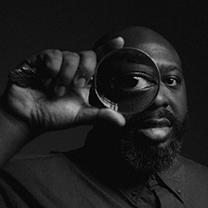 Today we feature a couple fragments from the conversation between American saxophonist, Darius Jones, and bassist William Parker, taken from the latter's most recent volume of interviews.
Today we feature a couple fragments from the conversation between American saxophonist, Darius Jones, and bassist William Parker, taken from the latter's most recent volume of interviews.
DJ: I was in my mid-twenties by that point. I don't think people really understand. There's no savviness to my shit, still. It was just like, oh, I'm just living. I'm like a fuckin' feral animal or something. I'm just like trying to figure out how to live, how to make a nest, you know, how to survive and do this thing that many, many motherfuckers back home would say, you couldn't do 'cause you Black and po'. I mean like literally that's what they would say to me, "You're Black and you're poor and you can't do this." And I just was like, "Yeah, OK, whatever. I'm gonna do it."
WP: But the thing is that we are not trained to accept who we are. When you study music, they say, well, you have all this tradition and that's put out there as an example. But they don't tell you that when you were born, a new tradition started and that you are yourself a tradition that's just coming into being.
Darius Jones, interview by William Parker, January 13, 2021, published in Conversations IV, edited by Ed Hazell, RogueArt, Paris, France, 2023, p. 127.
|
|
February 18, 2024
Kobo Abé (March 7, 1924 - January 22, 1993)
 Today we feature a quote from the Japanese existentialist, Kobo Abé, pseudonym of Kimifusa Abé. As an aside, this quote was used as the epigraph for The Wooing of Eva, an empty journal, written by David J. Keffer in Minneapolis, Minnesota and Washington, DC from December, 1995 to December, 1996, and deemed unpublishable by the Poison Pie Publishing House of Knoxville, Tennessee in July, 2016.
Today we feature a quote from the Japanese existentialist, Kobo Abé, pseudonym of Kimifusa Abé. As an aside, this quote was used as the epigraph for The Wooing of Eva, an empty journal, written by David J. Keffer in Minneapolis, Minnesota and Washington, DC from December, 1995 to December, 1996, and deemed unpublishable by the Poison Pie Publishing House of Knoxville, Tennessee in July, 2016.
No man or woman is wooed by theory alone.
—Kobo Abé, The Woman in the Dunes, translated by E. Dale Saunders, Alfred A. Knopf, New York, 1964, p. 136.
|
|
February 11, 2024
Keiji Haino (b. May 3, 1952)
 Today we feature a fragment of lyrics to a song by Keiji Haino, Japanese experimental musician and vocalist. As an aside, this quote was used as the epigraph for The Horties, an invisible novel, written by David J. Keffer in Knoxville, Tennessee from February, 2009 through December, 2010 and published by the Poison Pie Publishing House of Knoxville, Tennessee in November, 2012.
Today we feature a fragment of lyrics to a song by Keiji Haino, Japanese experimental musician and vocalist. As an aside, this quote was used as the epigraph for The Horties, an invisible novel, written by David J. Keffer in Knoxville, Tennessee from February, 2009 through December, 2010 and published by the Poison Pie Publishing House of Knoxville, Tennessee in November, 2012.
The tenderness remembered most
Is the calm when everything becomes nothing
When I no longer know which way to go is
When I rejoice most, I suppose
Watching you then is when I
No longer have need of wings
—Keiji Haino, from the lyrics to the song That which is becoming to me performed by Fushitsusha on the album A Death Never To Be Complete, English translation by Alan Cummings, Tokuma Japan Communications, 1997. (full lyrics)
|
|
February 9, 2024
Ellen Christi (b. March 7, 1958)
 Today we feature a quote from American jazz vocalist, Ellen Christi, taken from her interview in the latest (fourth) collection of dialogues by William Parker. Choosing just one passage from the interview to share proved very difficult. There were so many striking remarks. For those who want to read more, you are encouraged to seek out the whole interview.
Today we feature a quote from American jazz vocalist, Ellen Christi, taken from her interview in the latest (fourth) collection of dialogues by William Parker. Choosing just one passage from the interview to share proved very difficult. There were so many striking remarks. For those who want to read more, you are encouraged to seek out the whole interview.
And William, all I wanted to do was just have the freedom to sing. That was such an incredible feeling. That freedom. Incredible. And I'm still doing it now. It's not important to me whether you like the way I sing or not. That's a personal choice. But I have maintained my integrity as an artist. I'm still going to sing because a message comes through me. A certain energy. There's a reason I'm on the planet. Singing. I'm a musician; I'm an artist. And I accept that responsibility...I am here to sing.
Ellen Christi, interview by William Parker, January 13, 2021, published in Conversations IV, edited by Ed Hazell, RogueArt, Paris, France, 2023, p. 85.
|
|
February 4, 2024
Henry Threadgill (b. February 15, 1944)
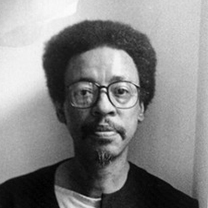 Today we feature a quote from the flautist, saxophonist, improviser and composer, Henry Threadgill. As an aside, this quote was used as the epigraph for Hebeloma's Swamp Fantasy Overture, a post-existential musical score generated through a non-idiomatic creative process, written by Hebeloma Crustuliniforme from January through December, 2021, and serially published by the Poison Pie Publishing House of Knoxville, Tennessee daily in 2021.
Today we feature a quote from the flautist, saxophonist, improviser and composer, Henry Threadgill. As an aside, this quote was used as the epigraph for Hebeloma's Swamp Fantasy Overture, a post-existential musical score generated through a non-idiomatic creative process, written by Hebeloma Crustuliniforme from January through December, 2021, and serially published by the Poison Pie Publishing House of Knoxville, Tennessee daily in 2021.
I'm trying to take a long view
within reason
about the music
I cannot tell
or say
anything
about the music
No expectations suggested
... the individual listener
let the music
is all I can offer
—Henry Threadgill from the liner notes to Tomorrow Sunny / The Revelry, Spp, PI Recordings, New York, 2012.
|
|
January 28, 2024
Italo Calvino (October 15, 1923 - September 19, 1985)
 Today we feature a quote from the Italian neo-fantasist, Italo Calvino. As an aside, this quote was used as the epigraph for The Dream Quest of Unknown Kadath (Revisited), a modern adaptation of the novella by H.P. Lovecraft, written by David J. Keffer in Knoxville, Tennessee from June through August, 2012, and published by the Poison Pie Publishing House of Knoxville, Tennessee in the autumn of 2012.
Today we feature a quote from the Italian neo-fantasist, Italo Calvino. As an aside, this quote was used as the epigraph for The Dream Quest of Unknown Kadath (Revisited), a modern adaptation of the novella by H.P. Lovecraft, written by David J. Keffer in Knoxville, Tennessee from June through August, 2012, and published by the Poison Pie Publishing House of Knoxville, Tennessee in the autumn of 2012.
Arriving at each new city, the traveler
finds again a past of his that he did not
know he had: the foreignness of what you
no longer are or no longer possess lies in
wait for you in foreign, unpossessed
places.
—Italo Calvino, from Invisible Cities, translated by William Weaver, Harcourt Brace Jovanovich Publishers, San Diego, 1974, pp. 28-29.
|
|
January 21, 2024
Keiji Haino (b. May 3, 1952)
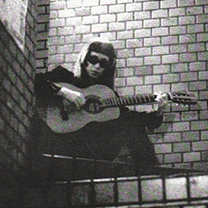 Today we feature a prayer by Keiji Haino, dark shaman of the Tokyo experimental underground. The prayer memorializes the passing of English improvising guitarist, Derek Bailey (January 29, 1930 - December 25, 2005). In April, 2006, the staff of the PPPH created a broadside featuring this prayer, which has hung in the office since that time and was posted online. This prayer also was used as the epigraph for The Sutra of Reverse Possession, a novel of non-idiomatic improvisation, written by David J. Keffer in Seoul, Korea & Knoxville, Tennessee from December, 2010 through May, 2012, and published by the Poison Pie Publishing House of Knoxville, Tennessee in December, 2012.
Today we feature a prayer by Keiji Haino, dark shaman of the Tokyo experimental underground. The prayer memorializes the passing of English improvising guitarist, Derek Bailey (January 29, 1930 - December 25, 2005). In April, 2006, the staff of the PPPH created a broadside featuring this prayer, which has hung in the office since that time and was posted online. This prayer also was used as the epigraph for The Sutra of Reverse Possession, a novel of non-idiomatic improvisation, written by David J. Keffer in Seoul, Korea & Knoxville, Tennessee from December, 2010 through May, 2012, and published by the Poison Pie Publishing House of Knoxville, Tennessee in December, 2012.
A Prayer for the Repose of the Soul of Derek Bailey
That, which while enfolding this now and
present perfume,
speaks, ‘I will use to the fullest this form
bestowed upon me’
and blurs into the firmament~
ah, where and in what form will it next be
devised
—Keiji Haino, published in The Wire, February 2006, issue 264, page 33.
|
|
January 14, 2024
Donald Justice (August 12, 1925 - August 6, 2004)
 Today we feature a bit of poem, which we have liked for many years, by the American poet and educator, Donald Justice. A fragment of this poem, consisting of the final five lines, was used as the epigraph to the novel, Symptoms of the Lunatic, written by David J. Keffer in Washington, D.C. from February to July, 1997 and
published by the Poison Pie Publishing House of Knoxville Tennessee in February, 2013.
Today we feature a bit of poem, which we have liked for many years, by the American poet and educator, Donald Justice. A fragment of this poem, consisting of the final five lines, was used as the epigraph to the novel, Symptoms of the Lunatic, written by David J. Keffer in Washington, D.C. from February to July, 1997 and
published by the Poison Pie Publishing House of Knoxville Tennessee in February, 2013.
But we did not ourselves know what the end was.
People like us simply go on.
We have our flaws, perhaps a few private virtues,
But it is by blind chance only that we escape tragedy.
And there is no plot in that; it is devoid of poetry.
Donald Justice, from Pantoum of the Great Depression published in New and Selected Poems, Alfred A. Knopf, New York, 1995, pp. 22-23;
archived at the Poetry Foundation.
|
|
November 9, 2023
Clifford Allen (b. 1977)
 The staff of the Poison Pie Publishing House picked up two books published in 2023 by RogueArt. One of them is a book about the American pianist, Matthew Shipp (b. December 7, 1960). The book includes wide-ranging interviews with Shipp collaborators conducted by music historian, Clifford Allen. Our quote for today comes from this book.
The staff of the Poison Pie Publishing House picked up two books published in 2023 by RogueArt. One of them is a book about the American pianist, Matthew Shipp (b. December 7, 1960). The book includes wide-ranging interviews with Shipp collaborators conducted by music historian, Clifford Allen. Our quote for today comes from this book.
The instrumentation is the composition already, you've scored it just by showing up and bringing people together who know what one another's capabilities are.
Clifford Allen, published in Singularity Codex: Matthew Shipp on RogueArt, RogueArt, Paris, France, 2023, p. 40.
|
|
August 11, 2023
Mark Helias (b. October 1, 1950)
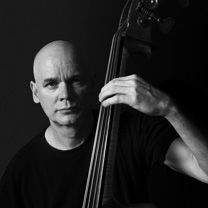 In teaching the course, The Golden Age of Non-Idiomatic Improvisation, at the University of Tennessee over the course of a decade, the staff of the Poison Pie Publishing House have accumulated a collection of books used as a reference library. Upon arrival, some books are read in their entirety, while portions of others are read before the book is put away for future reference. Included in this collection are three volumes of William Parker's "Conversations" with musicians published by RogueArt in 2011, 2015 and 2019. We had initially treated these books as one might an encyclopedia, a valuable resource to be explored when one was interested in a particular musician. However, that idea left much of the books unread. So this summer we began reading them (in reverse order) from first page to last. It turned out to be quite an unexpected pleasure. Before we had just read about musicians whom we already knew well. It turned out that the other conversations were amazing introductions to musicians about whom we knew little or nothing at all. For each new voice, we were motivated to listen to at least one album, often mentioned in the conversation. We recently finished Volume 3 and have begun volume 2. The conversation with American bassist Mark Helias is full of wisdom. It proved very difficult to pick just one passage from the interview to share on this site. For those who want to read more, you are encouraged to seek out all three volumes. (For the curious, the album we relistened to while reading this interview was Quintet (Basel) 1977 (hatOLOGY, 2016) featuring the star-studded cast of Anthony Braxton (reeds), George Lewis (trombone), Muhal Richard Abrams (piano), Mark Helias (bass) and Charles "Bobo" Shaw (drums).)
In teaching the course, The Golden Age of Non-Idiomatic Improvisation, at the University of Tennessee over the course of a decade, the staff of the Poison Pie Publishing House have accumulated a collection of books used as a reference library. Upon arrival, some books are read in their entirety, while portions of others are read before the book is put away for future reference. Included in this collection are three volumes of William Parker's "Conversations" with musicians published by RogueArt in 2011, 2015 and 2019. We had initially treated these books as one might an encyclopedia, a valuable resource to be explored when one was interested in a particular musician. However, that idea left much of the books unread. So this summer we began reading them (in reverse order) from first page to last. It turned out to be quite an unexpected pleasure. Before we had just read about musicians whom we already knew well. It turned out that the other conversations were amazing introductions to musicians about whom we knew little or nothing at all. For each new voice, we were motivated to listen to at least one album, often mentioned in the conversation. We recently finished Volume 3 and have begun volume 2. The conversation with American bassist Mark Helias is full of wisdom. It proved very difficult to pick just one passage from the interview to share on this site. For those who want to read more, you are encouraged to seek out all three volumes. (For the curious, the album we relistened to while reading this interview was Quintet (Basel) 1977 (hatOLOGY, 2016) featuring the star-studded cast of Anthony Braxton (reeds), George Lewis (trombone), Muhal Richard Abrams (piano), Mark Helias (bass) and Charles "Bobo" Shaw (drums).)
WP: I heard Ornette Coleman for years before I heard Charlie Parker. And I actually heard Cecil Taylor for years before I really heard Monk. Later on you pick up on it but that's just how it went down.
MH: Yeah, it's interesting. You got the direction but you've got this sort of biased direction, right? It was like you were funneled into ths area but they didn't give you the broad strokes about the whole thing. And that's a discovery I guess we all have to make on our own, sort of integrating all the stuff. And also, the question of what is American culture depends on where you come from, what that is identified as. And I'm discovering all this music that's supposedly not part of my experience; but on the other hand, no music is part of my experience.
Mark Helias, interview by William Parker, December 19, 2012, published in Conversations II: Dialogues and Monologues, edited by Ed Hazell, RogueArt, Paris, France, 2015, p. 17.
|
|
July 31, 2023
The Plague
 This summer, one member of the staff of the Poison Pie Publishing House chose to reread The Plague by Albert Camus, which he had last read as a high school student in the 1980's. The book had a profound effect on his philosophical outlook at the time and, over the decades, remains a key stone in the foundation of the PPPH, which specializes in post-existential literature. Originally published as La Peste in 1947, we read a copy from the University of Tennessee library of the English translation by Stuart Gilbert in an edition published by Alfred A. Knopf in 1957. Below, we share nine brief quotes from The Plague that particularly resonated with us. The quotes are presented in order of appearance.
This summer, one member of the staff of the Poison Pie Publishing House chose to reread The Plague by Albert Camus, which he had last read as a high school student in the 1980's. The book had a profound effect on his philosophical outlook at the time and, over the decades, remains a key stone in the foundation of the PPPH, which specializes in post-existential literature. Originally published as La Peste in 1947, we read a copy from the University of Tennessee library of the English translation by Stuart Gilbert in an edition published by Alfred A. Knopf in 1957. Below, we share nine brief quotes from The Plague that particularly resonated with us. The quotes are presented in order of appearance.
I. On Ignorance
But the narrator is inclined to think that by attributing overimportance to praiseworthy actions one may, by implication, be paying indirect but potent homage to the worse side of human nature. For this attitude implies that such actions shine out as rare exceptions, while callousness and apathy are the general rule. The narrator does not share that view. The evil that is in the world always comes of ignorance, and good intentions may do as much harm as malevolence, if they lack understanding. On the whole, men are more good than bad; that, however, isn't the real point. But they are more or less ignorant, and it is this that we call vice or virtue; the most incorrigible vice being that of an ignorance that fancies it knows everything and therefore claims for itself the right to kill. The soul of the murderer is blind; and there can be no true goodness nor true love without the utmost clear-sightedness.
—pp. 120-121.
II. On Common Decency
"However, there's one thing I must tell you: there's no question of heroism in all this. It's a matter of common decency. That's an idea which may make some people smile, but the only means of fighting a plague is—common decency."
—Dr. Bernard Rieux, p. 150.
III. On the Moral Compulsion of Existentialism
"For nothing in the world is it worth turning one's back on what one loves. Yet that is what I'm doing, though why I do not know."
—Dr. Bernard Rieux, p. 188.
IV. On the Intolerability of the Natural Order
"That sort of thing is revolting because it passes our human understanding. But perhaps we should love what we cannot understand."
Rieux straightened up slowly. He gazed at Paneloux, summoning to his gaze all the strength and fervor he could muster against weariness. Then he shook his head.
"No, Father. I've a very different idea of love. And until my dying day I shall refuse to love a scheme of things in which children are put to torture."
—Conversation between Fr. Paneloux and Dr. Rieux, pp. 196-197.
V. On Choosing to Err on the Side of Light
"All I maintain is that on this earth there are pestilences and there are victims, and it's up to us, so far as possible, not to join forces with the pestilences."
—Jean Tarrou, p. 229.
VI. On Being a Man
"But, you know, I feel more fellowship with the defeated than with saints. Heroism and sanctity don't really appeal to me, I imagine. What interests me is being a man."
"Yes, we're both after the same thing, but I'm less ambitious."
—conversation between Dr. Rieux and Tarrou, p. 231.
VII. On Witnessing the Death of a Friend
This human form, his friend's, lacerated by the spear-thrusts of the plague, consumed by searing, superhuman fires, buffeted by all the raging winds of heaven, was foundering under his eyes in the dark flood of the pestilence, and he could do nothing to avert the wreck. He could only stand, unavailing, on the shore, empty-handed and sick at heart, unarmed and helpless yet again under the onset of calamity. And thus, when the end came, the tears that blinded Rieux's eyes were tears of impotence; and he did not see Tarrou roll over, face to wall, and die with a short, hollow groan as if somewhere within him an essential chord had snapped.
—p. 260.
VIII. Why Existentialists Create Arbitrary Purpose
It was thus, most probably, that Tarrou had lived, and he realized the bleak sterility of life without illusions.
—p. 263.
IX. On the Purpose of Existential Writing
And it was in the midst of shouts rolling against the terrace wall in massive waves that waxed in volume and duration, while cataracts of colored fire fell thicker through the darkness, that Dr. Rieux resolved to compile this chronicle, so that he should not be one of those who hold their peace but should bear witness in favor of those plague-stricken people; so that some memorial of the injustice and outrage done them might endure; and to state quite simply what we learn in a time of pestilence: that there are more things to admire in men than to despise.
—p. 278.
|
|
July 21, 2023
Peter Brötzmann
 The staff of the Poison Pie Publishing House only learned today that the German free saxophonist, Peter Brötzmann died nearly a month ago on June 22, 2023. In tribute, we repost a quote from Brötzmann that first appeared on this blog on March 22, 2013.
The staff of the Poison Pie Publishing House only learned today that the German free saxophonist, Peter Brötzmann died nearly a month ago on June 22, 2023. In tribute, we repost a quote from Brötzmann that first appeared on this blog on March 22, 2013.
After over thirty years, it may look and sound a little bit
different, but in the end, I think my inspiration still comes from the
same place. When I was a young man, I thought I could change the
world. I was angry. And now, after all of these years and all that we
may have done to try and make things better, it has done nothing! We
are just as foolish as we have always been. But that shouldn’t be a
resignation. We have reason to be optimistic and we must try to make
a difference.
Peter Brötzmann (March 6, 1941 — June 22, 2023)
From “Music and the Creative Spirit: Innovators in Jazz, Improvisation and the Avant-Garde” by Lloyd Peterson,
Scarecrow Press, Lanham, Maryland, 2006, p. 33.
The Peter Brötzmann album that we chose to listen to today in memoriam was the solo album, Nothing to Say: A Suite Of Breathless Motion Dedicated To Oscar Wilde (FMP, 1996).
|
|
April 28, 2023
Pheeroan akLaff (b. January 27, 1955)
 This is the devil's music, but the devil is not Lucifer himself; the devil is the degree to which you're willing to completely focus on this and ignore a lot of other things that might be healthy for the overall balance of your development.
This is the devil's music, but the devil is not Lucifer himself; the devil is the degree to which you're willing to completely focus on this and ignore a lot of other things that might be healthy for the overall balance of your development.
Pheeroan akLaff, interview by William Parker, February 18, 2016, published in Conversations III, edited by Ed Hazell, RogueArt, Paris, France, 2019, p. 118.
|
|
March 2, 2023
Nicole Mitchell (b. February 17, 1967)
 Beauty, in the way that western hegemony dictates it, is not nearly whole enough to embrace all of us, especially us others. In my musical development, I've reached for what I call the edge of beauty, venturing out into spaces where one becomes uncomfortable and unsure whether what they're experiencing is beautiful or not. I seek this edge sonically. I add my singing voice or a growl to my flute sound to make the atonal melding of textures, because I see discomfort as a doorway to new revelations—new worlds. This call for imagining an alternative reality through creative work is, in a sense, a response to the need for a wider, more inclusive celebration of beauty.
Beauty, in the way that western hegemony dictates it, is not nearly whole enough to embrace all of us, especially us others. In my musical development, I've reached for what I call the edge of beauty, venturing out into spaces where one becomes uncomfortable and unsure whether what they're experiencing is beautiful or not. I seek this edge sonically. I add my singing voice or a growl to my flute sound to make the atonal melding of textures, because I see discomfort as a doorway to new revelations—new worlds. This call for imagining an alternative reality through creative work is, in a sense, a response to the need for a wider, more inclusive celebration of beauty.
--Nicole Mitchell Gantt, The Mandorla Letters, Green Lantern Press, Chicago, 2022, p. 182.
|
|
October 6, 2021
Meaning in Life
The staff of the Poison Pie Publishing House came across a recently published article with a definition of "meaning in life", which we found interesting.
[M]ost definitions of meaning in life include at least three components, significance (the feeling that one's life and contributions matter to society), purpose (having one's life driven by the pursuit of valued goals), and coherence or comprehensibility (the perception that one's life make sense).
—Jake Womick, John Eckelkamp, Sam Luzzo, Sarah J. Ward, S. Glenn Baker, Alison Salamun & Laura A. King, "Exposure to authoritarian values leads to lower positive affect, higher negative affect, and higher meaning in life", PLoS ONE 16(9): e0256759, September 15, 2021, link.
This confirms two suspicions long-held by the PPPH staff, first, that there is, in fact, a simple definition of "meaning in life" and, second, that "meaning in life" is generally over-rated.
We take this moment to remind our readership of one of the PPPH pithy maxims, "Not knowing is the triumph of evolution."
|
|
February 3, 2021
 Voltaire (François-Marie Arouet; November 21, 1694 - May 30, 1778)
Voltaire (François-Marie Arouet; November 21, 1694 - May 30, 1778)
Truly, whoever can make you believe absurdities can make you commit atrocities.
Originally, Certainement qui est en droit de vous rendre absurde est en droit de vous rendre injuste.
--Voltaire, Questions sur les miracles, 1765, full text.
|
|
November 10, 2020
 Alexandra Grimal (May 28, 1980-)
Alexandra Grimal (May 28, 1980-)
I love poetry, abstraction, and beauty. I love to be questioned by a work of Art. Questioned in a light, deep, and sometimes humorous way. To me, joy is much more efficient in terms of opening thoughts than dramas. I like to put the audience into a reflective and serene state. So that everyone's inner vision of life can reveal itself and blossom into the world for other human beings around.
--Alexandra Grimal, The Efficient Thought-Opener of Joy: An Interview with Alexandra Grimal, An International Journal of Exploratory Meta-Living, #13, 2020, full text.
|
|
September 28, 2020
 Confucius (551-479 BC)
Confucius (551-479 BC)
The Master said, "Do you think, my disciples, that I have any concealments? I conceal nothing from you. There is nothing which I do that is not shown to you, my disciples; that is my way...I am fortunate! If I have any errors, people are sure to know them."
--The Analects, Book II, Ch. 7, translated by James Legge, full text.
|
|
July 30, 2020
John Lewis (February 21, 1940 - July 17, 2020)
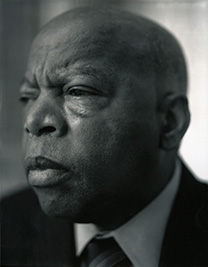 He [Dr. Martin Luther King Jr.] said we are all complicit when we tolerate injustice. He said it is not enough to say it will get better by and by. He said each of us has a moral obligation to stand up, speak up and speak out. When you see something that is not right, you must say something. You must do something. Democracy is not a state. It is an act, and each generation must do its part to help build what we called the Beloved Community, a nation and world society at peace with itself.
He [Dr. Martin Luther King Jr.] said we are all complicit when we tolerate injustice. He said it is not enough to say it will get better by and by. He said each of us has a moral obligation to stand up, speak up and speak out. When you see something that is not right, you must say something. You must do something. Democracy is not a state. It is an act, and each generation must do its part to help build what we called the Beloved Community, a nation and world society at peace with itself.
Ordinary people with extraordinary vision can redeem the soul of America by getting in what I call good trouble, necessary trouble. Voting and participating in the democratic process are key. The vote is the most powerful nonviolent change agent you have in a democratic society. You must use it because it is not guaranteed. You can lose it.
--"Together, You Can Redeem the Soul of Our Nation", New York Times, July 30, 2020, opinion column written by John Lewis, to be published on the day of his funeral, full text.
|
|
March 21, 2020
Fyodor Dostoyevsky (November 11, 1821 - February 9, 1881)
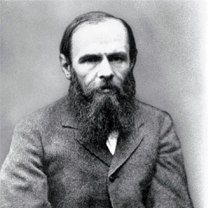 I am bound to shoot myself because the highest point of my self-will is to kill myself with my own hands.
I am bound to shoot myself because the highest point of my self-will is to kill myself with my own hands.
--spoken by Alexei Nilych Kirillov in Chapter 6. A Busy Night of The Possessed, Fyodor Dostoyevsky, 1871-2, translated by Constance Garnett.
|
|
October 18, 2019
Tomeka Reid (b. 1977)
 Yesterday, we got a hold of the third installment of William Parker's Conversations books, in which he interviews musicians involved in creative music. We have thoroughly enjoyed the first two volumes and, since we saw it advertised on the RogueArt website, we waited somewhat impatiently for a distributor in the United States to list the book. The table of contents provided thirty-five interviews of luminaries from the stage of creative music. While we are interested in hearing the perspectives of many of these individuals, we chose to start with Tomeka Reid, from whom we had not previously read an interview. This particular interview has a substantial biographical component, interspersed with philosophical insights. As we teach our course on The Golden Age of Non-Idiomatic Improvisation at the University of Tennessee in Knoxville, we like to investigate the sources of courage for creating in unconventional directions. Each musician provides a unique perspective on this discussion. Here we include a short excerpt from Tomeka Reid's interview pertinent to this subject.
Yesterday, we got a hold of the third installment of William Parker's Conversations books, in which he interviews musicians involved in creative music. We have thoroughly enjoyed the first two volumes and, since we saw it advertised on the RogueArt website, we waited somewhat impatiently for a distributor in the United States to list the book. The table of contents provided thirty-five interviews of luminaries from the stage of creative music. While we are interested in hearing the perspectives of many of these individuals, we chose to start with Tomeka Reid, from whom we had not previously read an interview. This particular interview has a substantial biographical component, interspersed with philosophical insights. As we teach our course on The Golden Age of Non-Idiomatic Improvisation at the University of Tennessee in Knoxville, we like to investigate the sources of courage for creating in unconventional directions. Each musician provides a unique perspective on this discussion. Here we include a short excerpt from Tomeka Reid's interview pertinent to this subject.
It was interesting that I was in this music, because it wants you to--it's about the journey, people watching the journey, they like that story of you discovering yourself. People like saying, "I remember when you were nervous on stage, and now look at you!" People follow your path and they--I think they like that, but I was coming from survival mode. I've got to be good at this because I got to take care of myself, it's just coming from my family situation--a part of me feels guilty for going into music because I came from such instability. "Do you really want to go and follow a path where you don't know and you are not at that level that you need to be at and most people are at?" I kept dabbling with it. I kept practicing, and I was curious about it.
--Tomeka Reid, interview by William Parker, November 13, 2018, published in Conversations III, edited by Ed Hazell, RogueArt, Paris, France, 2019, pp. 371-372.
|
|
June 2, 2018
Cecil Taylor (March 15, 1929-April 5, 2018)
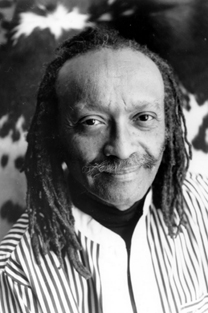 Recently, we heard the news that the American jazz pianist, Cecil Taylor, had died earlier this spring. Almost two months passed before we knew of it, which is par for the course. In our defense, we can favorably portray this gap by acknowledging that we don't play the role of vultures, hanging over the obituaries on a daily basis. Even in our ignorance, the music of Cecil Taylor has been on our minds. As we write one passage of Piecemeal for each day of 2018, we continue our practice of doing so to a piece of recorded music. On the dates from April 21, 2018 to May 1, 2018, we wrote to the entirety of the ten disc set of the Cecil Taylor Feel Trio (with William Parker on bass and Tony Oxley on drums), 2 Ts For A Lovely T (Codanza Records, Codanza One, 2002 (originally recorded 1990), United Kingdom, cdx10, discogs.com). While the original ten cd set is pricey, for those so inclined the digital files of the roughly 10 hour release can be purchased for about a dollar an hour.
Recently, we heard the news that the American jazz pianist, Cecil Taylor, had died earlier this spring. Almost two months passed before we knew of it, which is par for the course. In our defense, we can favorably portray this gap by acknowledging that we don't play the role of vultures, hanging over the obituaries on a daily basis. Even in our ignorance, the music of Cecil Taylor has been on our minds. As we write one passage of Piecemeal for each day of 2018, we continue our practice of doing so to a piece of recorded music. On the dates from April 21, 2018 to May 1, 2018, we wrote to the entirety of the ten disc set of the Cecil Taylor Feel Trio (with William Parker on bass and Tony Oxley on drums), 2 Ts For A Lovely T (Codanza Records, Codanza One, 2002 (originally recorded 1990), United Kingdom, cdx10, discogs.com). While the original ten cd set is pricey, for those so inclined the digital files of the roughly 10 hour release can be purchased for about a dollar an hour.
We routinely include the music of Cecil Taylor in our course, The Golden Age of Non-Idiomatic Improvisation, at the University of Tennessee in Knoxville. Over the years, we have discovered that the youtube video of Cecil Taylor that most appeals to young ears is this one from Ron Mann's 1981 free jazz documentary Imagine the Sound. In the class, we think about motivations for creating in unconventional directions and the various sources of courage for doing so. In this vein, we provide the following quote from Cecil Taylor.
A spirit! That force, you know--I realize that my mother had that force. But what she decided not to do with it--and if you have that force and you don't use it, then you die. Because if you kill that force your body follows afterwards. My uncle, her only brother, he could live in the house with us as long as he would not be a musician. And he died of cancer at the age of thirty-four. He gave me drum lessons.
--Cecil Taylor, interview by Chris Funkhouser, Sept 3, 1994, published in Hambone #12.
|
|
April 4, 2018
H.P. Lovecraft
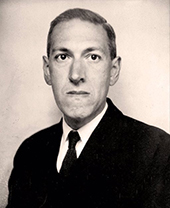 Recently we listened to an audiobook of the short story, The Silver Key, written by H.P. Lovecraft (August 20, 1890 - March 15, 1937). The same admiration of this text of an admittedly flawed author, which we felt when we first read the words, came upon us again. Weeks later we were induced to reproduce an extended passage here.
Recently we listened to an audiobook of the short story, The Silver Key, written by H.P. Lovecraft (August 20, 1890 - March 15, 1937). The same admiration of this text of an admittedly flawed author, which we felt when we first read the words, came upon us again. Weeks later we were induced to reproduce an extended passage here.
He had read much of things as they are, and talked with too many people. Well-meaning philosophers had taught him to look into the logical relations of things, and analyse the processes which shaped his thoughts and fancies. Wonder had gone away, and he had forgotten that all life is only a set of pictures in the brain, among which there is no difference betwixt those born of real things and those born of inward dreamings, and no cause to value the one above the other. Custom had dinned into his ears a superstitious reverence for that which tangibly and physically exists, and had made him secretly ashamed to dwell in visions. Wise men told him his simple fancies were inane and childish, and even more absurd because their actors persist in fancying them full of meaning and purpose as the blind cosmos grinds aimlessly on from nothing to something and from something back to nothing again, neither heeding nor knowing the wishes or existence of the minds that flicker for a second now and then in the darkness.
They had chained him down to things that are, and had then explained the workings of those things till mystery had gone out of the world. When he complained, and longed to escape into twilight realms where magic moulded all the little vivid fragments and prized associations of his mind into vistas of breathless expectancy and unquenchable delight, they turned him instead toward the new-found prodigies of science, bidding him find wonder in the atom's vortex and mystery in the sky's dimensions. And when he had failed to find these boons in things whose laws are known and measurable, they told him he lacked imagination, and was immature because he preferred dream-illusions to the illusions of our physical creation.
So Carter had tried to do as others did, and pretended that the common events and emotions of earthy minds were more important than the fantasies of rare and delicate souls. He did not dissent when they told him that the animal pain of a stuck pig or dyspeptic ploughman in real life is a greater thing than the peerless beauty of Narath with its hundred carven gates and domes of chalcedony, which he dimly remembered from his dreams; and under their guidance he cultivated a painstaking sense of pity and tragedy.
Once in a while, though, he could not help seeing how shallow, fickle, and meaningless all human aspirations are, and how emptily our real impulses contrast with those pompous ideals we profess to hold. Then he would have recourse to the polite laughter they had taught him to use against the extravagance and artificiality of dreams; for he saw that the daily life of our world is every inch as extravagant and artificial, and far less worthy of respect because of its poverty in beauty and its silly reluctance to admit its own lack of reason and purpose. In this way he became a kind of humorist, for he did not see that even humour is empty in a mindless universe devoid of any true standard of consistency or inconsistency.
--H.P. Lovecraft from "The Silver Key", written 1926, published January 1929 in Weird Tales, full text dagonbytes.com.
|
|
January 31, 2018
Nicole Mitchell
 Today we received a copy of Arcana VIII: Musicians on Music in the mail. We flipped through the table of contents and decided to read the contribution from the American flautist and composer, Nicole Mitchell, first. We found this passage to be in a very different vein than the previous interviews and writings by Ms. Mitchell. Here we share a quote from the book.
Today we received a copy of Arcana VIII: Musicians on Music in the mail. We flipped through the table of contents and decided to read the contribution from the American flautist and composer, Nicole Mitchell, first. We found this passage to be in a very different vein than the previous interviews and writings by Ms. Mitchell. Here we share a quote from the book.
Outside that wall, I have to say, it's not that it's magical. It's untouchable and unseeable, but it's real. You know, better than that, if you practice your connection to the stars enough, you can go anytime you please...And even better, I'm tellin' you, there are no consequences, no punishments and no side effects except joy and more strength. Can you imagine? I'm thinking, maybe we can build a bridge from pain to hope and insight and take all our families there...Maybe our barcodes can even be rubbed off? This new awareness, this realm of making, this dark maroon cloud, it's a hidden choice that we all have, but it's been so lied about and covered up with opaque abuses and accusations and candy wrappers. It's hard to find. I wanted you to know! I think the bridge was discarded by the shoebox designers thousands of cycles ago. It was taken from our schools because they feared it would weaken our obedience. Only some of our elders remember now. In truth, it's a birthright to our species, perhaps the most important one. A gift directly from the blue marble that we all depend on, and now, like sight, the vision behind one's closed eyes to the maroon clouds of otherness is a mine of our mind where we can excavate new designs of sound, paper, ink, words and on one can stop us. You know when you know, you know. No one can take that from you.
--Nicole Mitchell, from "What Was Feared Lost", collected in Arcana VIII: Musicians on Music, edited by John Zorn, Hips Road, New York, 2017, p. 223.
|
|
March 16, 2017
Marcus Aurelius
 Today we feature a quote from the Roman Emperor, Marcus Aurelius (April 26, 121 - March 17, 180 AD).
Today we feature a quote from the Roman Emperor, Marcus Aurelius (April 26, 121 - March 17, 180 AD).
Everything which is in any way beautiful is beautiful in itself, and terminates in itself, not having praise as part of itself. Neither worse then nor better is a thing made by being praised. I affirm this also of the things which are called beautiful by the vulgar, for example, material things and works of art. That which is really beautiful has
no need of anything; not more than law, not more than truth, not more than benevolence or modesty. Which of these things is beautiful because it is praised, or spoiled by being blamed? Is such a thing as an emerald made worse than it was, if it is not praised? Or gold, ivory, purple, a lyre, a little knife, a flower, a shrub?
--Marcus Aurelius, from Meditations, Book IV, written 161-180 AD, translated by George Long.
|
|
November 30, 2016
Paal-Helge Haugen
 It seems to be a week for quotes. Today we feature a poem by the Norwegian writer, Paal-Helge Haugen (April 26, 1945 - ).
It seems to be a week for quotes. Today we feature a poem by the Norwegian writer, Paal-Helge Haugen (April 26, 1945 - ).
The God of Tiny Islands
Where the surface of the endless ocean is broken by reefs and atolls and the remnants of extinct volcanoes, his domain begins. It is his delight to see life breaking out from rock and volcanic ash, seeds carried by the wind, birds building their nests and turtles making their way onto the beaches. The big islands can manage on their own, the small ones need his protection. He stands in the service of creation. New islands come into being even as he thinks them out. When they are fully formed, he sees that it is good and that all things are as they should be. The plains extend to the water's edge, the grass is soft under his feet and the salt winds ruffle his white hair. He herds the clouds and brings them home at sunset to provide the world with wetness. He wishes to share these things with us, but as we fail to answer he talks to his own echo and addresses beetles in the language of beetles. On the smallest of islands he has built a shelter of branches where he will let us stay. His own desire would be to sit through eternity watching running water and the wind in the delicate tracery of the aspen's seismographs, the marriage of time and space enacted and ever changing in aimless movement. At the hour of twilight he wanders over small grasslands with a cat who lets him hear the story of the very first creation.
--Paal-Helge Haugen, from Uncommon Deities, translated by Annabelle Despard, samadhisound, Nashua, New Hampshire, 2012, p. 44.
|
|
November 29, 2016
Pauline Oliveros
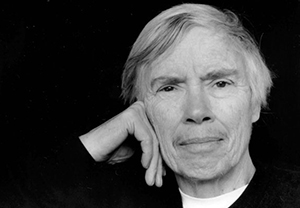 Today we feature a meditation by the American electronic music pioneer and accordionist, Pauline Oliveros (May 30, 1932 - November 24, 2016), who died on Thursday. This particular meditation was performed in several offerings of the course, The Golden Age of Non-Idiomatic Improvisation at the University of Tennessee, often with hilarious results.
Today we feature a meditation by the American electronic music pioneer and accordionist, Pauline Oliveros (May 30, 1932 - November 24, 2016), who died on Thursday. This particular meditation was performed in several offerings of the course, The Golden Age of Non-Idiomatic Improvisation at the University of Tennessee, often with hilarious results.
The New Sound Meditation (1989)
Listen
During any one breath
Make a sound
Breathe
Listen outwardly for a sound
Breathe
Make exactly the sound that someone else made
Breathe
Listen inwardly
Breathe
Make a new sound that no one else has made
Breathe
Continue this cycle until there are no more new sounds.
--Pauline Oliveros, from Deep Listening: A Composer's Sound Practice, iUniverse, Inc., New York, 2005, p. 44.
|
|
November 28, 2016
Paul Bley
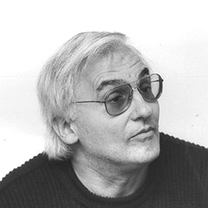 Today we feature two quotes by the Canadian pianist, Paul Bley (November 10, 1932 - January 3, 2016).
Today we feature two quotes by the Canadian pianist, Paul Bley (November 10, 1932 - January 3, 2016).
Rant #1. Practice makes perfect. Imperfect is better.
Rant #23. Not only can one make new music in real time, one can also write books, make paintings, invent theories & create life.
--Paul Bley, from Rants 2000, Improvising Artists (IAI), URL: http://www.improvart.com/bley/rants.htm.
|
|
November 14, 2016
Paul Klee
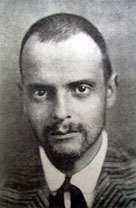 Today we feature a poem by the Swiss-German artist, Paul Klee (December 18, 1879 - June 29, 1940).
Today we feature a poem by the Swiss-German artist, Paul Klee (December 18, 1879 - June 29, 1940).
Irrational Speech #6
To love music
more than anything, that
is unhappiness.
--Paul Klee, from Some Poems by Paul Klee, translated by Anselm Hollo, Scorpion Press, Lowestoft, Suffolk, 1962, p. 13.
|
|
October 19, 2016
Vijay Iyer
 Today we feature a quote from the American pianist, Vijay Iyer (October 26, 1971-).
Today we feature a quote from the American pianist, Vijay Iyer (October 26, 1971-).
It was also made clear in this exchange that music can be viewed as a consequence
of active listening; it is, at some level, through informed listening that music is
constructed. Placing the skillful listener in such an active role explodes the
category of experiences that we call listening to music, because it allows the
listener the improvisatory freedom to frame any moment or any experience as a
musical one. The improvisor is always listening; the listener is always
improvising.
--Vijay Iyer, from Why Roscoe Mitchell is Important, Table & Chairs Music Blog, May 20, 2013.
|
|
August 5, 2016
Pär Lagerkvist
 Today we feature a quote from the Swedish author, Pär Lagerkvist (May 23, 1891 - July 11, 1974). He received the Nobel Prize in Literature in 1951.
Today we feature a quote from the Swedish author, Pär Lagerkvist (May 23, 1891 - July 11, 1974). He received the Nobel Prize in Literature in 1951.
She was indeed like a tree, which has no consciousness of itself, and is a secret. A great secret, perhaps. Yet the tree knows nothing of this: it is a secret even from itself...
She was like the trees. The wind is the worship that fills them, and to which at times--though not always--they listen. Their divine service is within themselves...
It was true that Mariamne needed no temple. Her worship was within her, and she could listen to it at any time. She was like a tree which the wind fills with its secret soughing.
--Pär Lagerkvist, from Mariamne, translated by Naomi Walford, Chatto & Windus, London, 1968, pp. 54, 68.
|
|
July 13, 2016
Janwillem van de Wetering
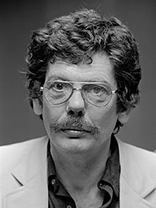 Today we feature a quote from the Dutch author, Janwillem van de Wetering (February 12, 1931-July 4, 2008).
Today we feature a quote from the Dutch author, Janwillem van de Wetering (February 12, 1931-July 4, 2008).
Dorin shrugged. "I don't know what my fellow officers base their guidance on, but I have never encouraged any idealism in my own men. I try not to believe in anything myself. Ultimately there is nothing, and it is better to believe in nothing from the start. But it takes great courage not to believe. My own life is continuous proof. Anything upsets me, even dead flies. But I try."
--Janwillem van de Wetering, from The Japanese Corpse, Houghton Mifflin Company, Boston, 1977, p. 203.
|
|
May 11, 2016
Harry Partch
 Today we feature a quote from the American composer, music theorist, and creator of musical instruments, Harry Partch (June 24, 1901-September 3, 1974).
Today we feature a quote from the American composer, music theorist, and creator of musical instruments, Harry Partch (June 24, 1901-September 3, 1974).
Originality cannot be a goal. It is simply inevitable. The truly path-breaking step can never be predicted, and certainly not by the person who makes it at the time he makes it. He clears as he goes, evolves his own techniques, devises his own tools, ignores where he must. And his path cannot be retraced, because each of us is an original being.
In the fragile moment of achievement the conditioned attitude evaporates, showing perhaps that there is, in total experience, a deep and abiding tie with peoples and animals and things removed in time and space. The adventurer will undoubtedly experience ridicule, but he is inured to danger; he was not born in the woods to get scared by an owl. To the extent that he is obliged to fly in the face of honored usages he begins to acquire, after decades of weathering, the strange patina of the recidivist, the unregenerate criminal.
--Harry Partch, from the "Preface to the Second Edition", in Genesis of a Music, 2nd Ed.
Da Capo Press, Boston, 1974 (1st Ed., 1949), p. xi.
|
|
March 21, 2016
Jorge Luis Borges
 Today we feature a sentiment by the Argentinian writer and scholar, Jorge Luis Borges (August 24, 1899-June 14 1986).
Today we feature a sentiment by the Argentinian writer and scholar, Jorge Luis Borges (August 24, 1899-June 14 1986).
I do not write for a select minority, which means nothing to me, nor for that adulated platonic entity known as "The Masses." Both abstractions, so dear to the demagogue, I disbelieve in. I write for myself and for my friends, and I write to ease the passing of time.
--Jorge Luis Borges, from the "Author's Note", in The Book of Sand (El Libro de Arena), translated by Norman Thomas di Giovanni,
E.P. Dutton, New York, 1977, p. 8.
|
|
November 13, 2015
Thelonious Monk
 The best thing about a Friday the 13th is listening to the song Friday the 13th composed by Thelonious Monk.
There is a version for quintet with Monk on piano accompanied by Sonny Rollins on tenor saxophone, Julius Watkins on French horn
Percy Heath on bass and Willie Jones on drums currently on youtube. There is another, even more lively version with a different quintet, in which the subdued French horn is replaced by a wild trombone. That version features Misha Mengelberg on piano, Steve Lacy on soprano saxophone, Kent Carter on bass, Han Bennink on drums and Roswell Rudd on trombone also currently on youtube. Listening to one or both of these songs every time a Friday the 13th rolls around is a highly recommended habit for healthy living.
The best thing about a Friday the 13th is listening to the song Friday the 13th composed by Thelonious Monk.
There is a version for quintet with Monk on piano accompanied by Sonny Rollins on tenor saxophone, Julius Watkins on French horn
Percy Heath on bass and Willie Jones on drums currently on youtube. There is another, even more lively version with a different quintet, in which the subdued French horn is replaced by a wild trombone. That version features Misha Mengelberg on piano, Steve Lacy on soprano saxophone, Kent Carter on bass, Han Bennink on drums and Roswell Rudd on trombone also currently on youtube. Listening to one or both of these songs every time a Friday the 13th rolls around is a highly recommended habit for healthy living.
|
|
October 23, 2015
Anthony Braxton
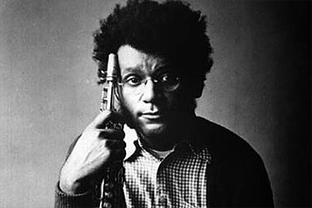 Today we feature a quote by the American musician, improviser and composer, Anthony Braxton (June 4, 1945-).
Here we present both a passage as well as a schematic and its interpretation from volume three of Tri-Axium Writings (1985).
Today we feature a quote by the American musician, improviser and composer, Anthony Braxton (June 4, 1945-).
Here we present both a passage as well as a schematic and its interpretation from volume three of Tri-Axium Writings (1985).
The present reality of participation in western culture can be viewed as profoundly detrimental to transformational expansion or spiritual resolidification and/or world unification - and this is true regardless of level of functionalism or specifics. If we are to ever hope for positive change, then some attempt must be made by the composite people on this planet to come to terms with the third degree of the 'responsibility of the position' - because this degree of participation is the highest degree for the 'greater good of all humanity'. To really view the realness of this concept it is necessary to apply its criterion of examination to the basic thrust of this book - that being, information dynamics and the reality of creative music.
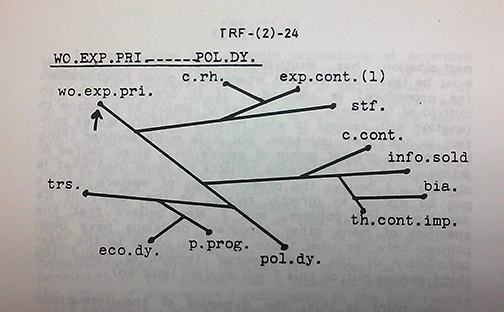
The schematic above can be rendered in words as, "The world expansion principle related to political dynamics is understood in the following three contexts: (1) source transfer via the composite focus of the expansion condition as revealed through composite research, (2) information solidification via composite continuance as defined by both the implications of thrust continuance and bi-aitionalism, and (3) transition via a path of particular progressionalism informed by economic dynamics."
--Anthony Braxton, from Tri-Axium Writings 3, Synthesis Music, distributed by Frog Peak Music, Hanover, New Hampshire, 1985, p. 492-493. (Schematic interpreted by David Keffer)
|
|
October 19, 2015
Jorge Luis Borges
 Today we feature a sentence by the Argentinian writer and scholar, Jorge Luis Borges (August 24, 1899-June 14 1986).
Today we feature a sentence by the Argentinian writer and scholar, Jorge Luis Borges (August 24, 1899-June 14 1986).
Mir Bahadur Ali is, as we have seen, incapable of evading the most vulgar of art's temptations: that of being a genius.
--Jorge Luis Borges, from "The Approach to Al-Mu'tasim", collected in Fictions (Ficciones), translated by Anthony Kerrigan,
Grove Press Incorporated, New York, 1962, p. 39-40.
|
|
October 16, 2015
A quote from Paul Krugman
 Today we reproduce a colorful sentence written by Paul Krugman (February 28, 1953--), an American economist, columnist and Nobel Laureate.
Today we reproduce a colorful sentence written by Paul Krugman (February 28, 1953--), an American economist, columnist and Nobel Laureate.
But with great wealth comes great pettiness: These are men accustomed to obsequious deference, and they took even mild comments about bad behavior by some of their number as an unforgivable insult.
--Paul Krugman, from the column, Democrats, Republicans and Wall Street Tycoons, published in the New York Times, October 16, 2015.
|
|
October 14, 2015
John Stuart Mill
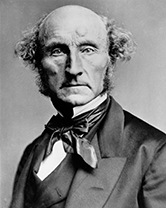 Today we take a left turn through history and feature a quote from John Stuart Mill (May 20, 1806--May 8, 1873), a British Philosopher.
Today we take a left turn through history and feature a quote from John Stuart Mill (May 20, 1806--May 8, 1873), a British Philosopher.
I am informed that the world is ruled by a being whose attributes are infinite, but what they are we cannot learn, nor what are the principles of his government, except that "the highest human morality which we are capable of conceiving" does not sanction them; convince me of it, and I will bear my fate as I may. But when I am told that I must believe this, and at the same time call this being by the names which express and affirm the highest human morality, I say in plain terms that I will not. Whatever power such a being may have over me, there is one thing which he shall not do: he shall not compel me to worship him. I will call no being good, who is not what I mean when I apply that epithet to my fellow-creatures; and if such a being can sentence me to hell for not so calling him, to hell I will go.
--John Stuart Mill, from An Examination of Sir William Hamilton's Philosophy, and of the Principal Philosophical Questions Discussed in his Writings, Chapter VII. The Philosophy of the Conditioned, as Applied by Mr. Mansel to the Limits of Religious Thought,
Longmans, Green & Co., London (1865) p. 103.
|
|
October 10, 2015
Primo Levi
 Today we feature a quote from Primo Levi (July 31, 1919--April 11, 1987), an Italian chemist, writer and Holocaust survivor.
Today we feature a quote from Primo Levi (July 31, 1919--April 11, 1987), an Italian chemist, writer and Holocaust survivor.
Why does one write?
- Because one feels the drive and the need to do so.
- To entertain oneself and others.
- To teach something to someone.
- To improve the world.
- To make one's ideas known.
- To free oneself from anguish.
- To become famous.
- To become rich.
- Out of habit.
--Primo Levi, from Why Does One Write? collected in Other People's Trades,
Summit Books, New York (1989) p. 74,
a translation by Raymond Rosenthal of L'altrui mestiere, published in 1985.
|
|
October 7, 2015
Garrison Fewell
 Today we feature a quote by Garrison Fewell (October 14, 1953-July 5, 2015), an American guitarist and improviser, who died this past summer. This quote is from a book of dialogues with musicians published through a Kickstarter campaign in 2014 and used as a reference book in the course, The Golden Age of Non-Idiomatic Improvisation offered at the University of Tennessee. Fewell makes this statement in a dialogue with the pianist, Marilyn Crispell.
Today we feature a quote by Garrison Fewell (October 14, 1953-July 5, 2015), an American guitarist and improviser, who died this past summer. This quote is from a book of dialogues with musicians published through a Kickstarter campaign in 2014 and used as a reference book in the course, The Golden Age of Non-Idiomatic Improvisation offered at the University of Tennessee. Fewell makes this statement in a dialogue with the pianist, Marilyn Crispell.
Originally the function of music was to express that which we can't express so easily with words, and to cause a kind of tuning, or attunement, in ourselves and in others.
--Garrison Fewell, Outside Music Inside Voices: Dialogues on Improvisation and the Spirit of Creative Music,
Saturn University Press, Somerville, MA (2014), p. 190.
|
|
August 20, 2015
Thomas Piketty
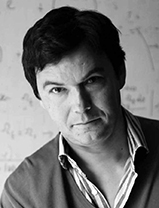 Today we feature a quote from the French economist, Thomas Piketty (May 7, 1971-).
Today we feature a quote from the French economist, Thomas Piketty (May 7, 1971-).
Our democratic societies rest on a meritocratic worldview, or at any rate a meritocratic hope, by which I mean a belief in a society in which inequality is based more on merit and effort than on kinship and rents. This belief and this hope play a very crucial role in modern society, for a simple reason: in a democracy, the professed equality of rights of all citizens contrasts sharply with the very real inequality of living conditions, and in order to overcome this contradiction it is vital to make sure that social inequalities derive from rational and universal principles rather than arbitrary contingencies. Inequalities must therefore be just and useful to all, at least in the realm of discourse and as far as possible in reality as well.
--Thomas Piketty, Capital in the Twenty-First Century, translated by Arthur Goldhammer,
the Belknap Press of Harvard University Press, Cambridge, MA (2014), p. 422.
|
|
August 9, 2015
Jorge Luis Borges
 Today we feature an entry from a bestiary by the Argentinian writer and scholar, Jorge Luis Borges (August 24, 1899-June 14 1986).
Today we feature an entry from a bestiary by the Argentinian writer and scholar, Jorge Luis Borges (August 24, 1899-June 14 1986).
The Double
Suggested or stimulated by reflections in mirrors and in water and by twins, the idea of the Double is common to many countries. It is likely that sentences such as A friend is another self by Pythagoras or the Platonic Know thyself were inspired by it. In Germany this Double is called Doppelgänger, which means "double walker." In Scotland there is the fetch, which comes to fetch a man to bring him to his death; there is also the Scottish word wraith for an apparition thought to be seen by a person in his exact image just before death. To meet oneself is, therefore, ominous. The tragic ballad "Ticonderoga" by Robert Louis Stevenson tells of a legend on this theme. There is also the strange picture by Rossetti ("How They Met Themselves") in which two lovers come upon themselves in the dusky gloom of a woods. We may also cite examples from Hawthorne ("Howe's Masquerade"), Dostoyevsky, Alfred de Musset, James ("The Jolly Corner"), Kleist, Chesteron ("The Mirror of Madmen"), and Hearn ("Some Chinese Ghosts).
The ancient Egyptians believed that the Double, the ka, was a man's exact counterpart, having his same walk and his same dress. Not only men, but gods and beasts, stones and trees, chairs and knives had their ka, which was invisible except to certain priests who could see the Doubles of the gods and were granted by them a knowledge of things past and things to come.
To the Jews the appearance of one's double was not an omen of imminent death. On the contrary, it was proof of having attained prophetic powers. This is how it is explained by Gershom Scholem. A legend recorded in the Talmud tells the story of a man who, in search of God, met himself.
In the story "William Wilson" by Poe, the Double is the hero's conscience. He kills it and dies. In a similar way, Dorian Gray in Wilde's novel stabs his portrait and meets his death. In Yeats's poems the Double is our other side, our opposite, the one who complements us, the one we are not nor will ever become.
Plutarch writes that the Greeks gave the name other self to a king's ambassador.
--Jorge Luis Borges with Margarita Guerrero, translated by Norm Thomas di Giovanni
The Book of Imaginary Beings (1967).
|
|
June 13, 2015
Ornette Coleman
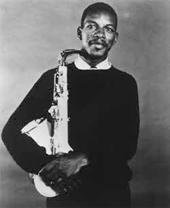 Today we feature an anecdote from an interview with the American saxophonist, improviser and composer, Ornette Coleman (March 9, 1930 - June 11, 2015), who died on Thursday.
Today we feature an anecdote from an interview with the American saxophonist, improviser and composer, Ornette Coleman (March 9, 1930 - June 11, 2015), who died on Thursday.
Coleman: I was in the South when minorities were oppressed, and I
identified with them through music. I was in Texas, I started to play the
saxophone and make a living for my family by playing on the radio. One
day, I walked into a place that was full of gambling and prostitution,
people arguing, and I saw a woman get stabbed--then I thought that I
had to get out of there. I told my mother that I didn't want to play this
music anymore because I thought that I was only adding to all that
suffering. She replied, "What's got hold of you, you want somebody to
pay you for your soul?" I hadn't thought of that, and when she told me
that, it was like I had been re-baptized.
JD: Your mother was very clear-headed.
OC: Yes, she was an intelligent woman. Ever since that day I've tried to
find a way to avoid feeling guilty for doing something that other people
don't do.
--Ornette Coleman
from The Other's Language: Jacques Derrida Interviews Ornette Coleman, June 23, 1997.
|
|
May 5, 2015
Wadada Leo Smith
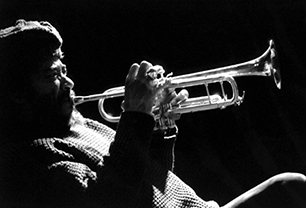 Today we feature a quote by the American musician and improviser Wadada Leo Smith (1941-).
Today we feature a quote by the American musician and improviser Wadada Leo Smith (1941-).
What is improvisation? Improvisation is an art form used by creative musicians to deliver an expression of musical thought at the very instant that their idea is conceived. The improvisor must have an ability to instantaneously organize sound, silence and rhythm with the whole of his or her intelligence. His total life experience is drawn from, including his faculties of right reasoning and the make-up of his psychological and physiological existence. All of these factors determine what is actually being expressed at the moment of conception and creation. Thus, at each instant, the improvisor's creation includes the entire spectrum of space and cycle of time (past, present and future). His music is not, like composition, one that is conceived as one idea at one instant, only to be funneled at a later time through a standard system of notation onto paper as merely a related idea, and finally interpreted and performed sometime in the future as an idea removed at least three times from the original.
--Leo Smith
notes (8 pieces) source a new world music: creative music , self-published, Chicago, IL, 1973.
|
|
April 25, 2015
The Simple Truth by Philip Levine
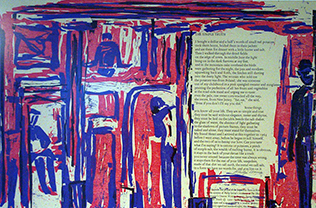 In my office at the University of Tennessee, I have a broadside featuring the poem, "The Simple Truth" by Philip Levine. This poem comes from the collection titled The Simple Truth published in 1994. There is a link to the poem here.
In my office at the University of Tennessee, I have a broadside featuring the poem, "The Simple Truth" by Philip Levine. This poem comes from the collection titled The Simple Truth published in 1994. There is a link to the poem here.
|
|
April 24, 2015
What Work Is by Philip Levine
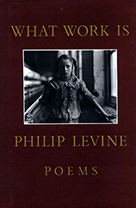 By 1992, I was a graduate student at the University of Minnesota. There was no author I wanted more to see in a reading than Philip Levine. Perhaps he was the only one. My younger sister told me that he was coming to do a reading at the Jesuit college, Rockhurst, in Kansas City, Missouri to promote his latest volume of poetry, "What Work Is". Early on the day of the reading I drove the 440 miles of I-35 from Minneapolis to Kansas City. I attended the reading with my sister and a friend, Rich Fisher. The poems were lovely. After the reading, I stood in line for him to sign my copy of the book. During our brief exchange, I was put off my Levine's brusque manner and off-the-cuff comments, which seemed quick to judgement and lacking the patient wisdom I associated with his poetry. This encounter did not diminish my appreciation for his poetry. It reinforced in me the idea that different expressions of oneself emerge through solitary composition and through spontaneous, verbal interaction (and that the written form is preferable in most cases). The encounter also suggested to me what many others may already know--that meeting an idol is likely an ill-advised endeavor, resulting in disappointment as often as not. I don't recall attending another poetry reading after this. This poem comes from the collection titled What Work Is published in 1991. There is a link to the poem here.
By 1992, I was a graduate student at the University of Minnesota. There was no author I wanted more to see in a reading than Philip Levine. Perhaps he was the only one. My younger sister told me that he was coming to do a reading at the Jesuit college, Rockhurst, in Kansas City, Missouri to promote his latest volume of poetry, "What Work Is". Early on the day of the reading I drove the 440 miles of I-35 from Minneapolis to Kansas City. I attended the reading with my sister and a friend, Rich Fisher. The poems were lovely. After the reading, I stood in line for him to sign my copy of the book. During our brief exchange, I was put off my Levine's brusque manner and off-the-cuff comments, which seemed quick to judgement and lacking the patient wisdom I associated with his poetry. This encounter did not diminish my appreciation for his poetry. It reinforced in me the idea that different expressions of oneself emerge through solitary composition and through spontaneous, verbal interaction (and that the written form is preferable in most cases). The encounter also suggested to me what many others may already know--that meeting an idol is likely an ill-advised endeavor, resulting in disappointment as often as not. I don't recall attending another poetry reading after this. This poem comes from the collection titled What Work Is published in 1991. There is a link to the poem here.
|
|
April 23, 2015
The Poem of Flight by Philip Levine
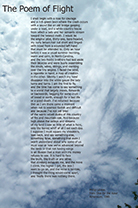 Continuing our tribute to Philip Levine, we post a link to a Levine masterpiece, "The Poem of Flight". This poem comes from the collection titled One for the Rose published in 1981. There is a link to the poem here.
Continuing our tribute to Philip Levine, we post a link to a Levine masterpiece, "The Poem of Flight". This poem comes from the collection titled One for the Rose published in 1981. There is a link to the poem here.
|
|
April 22, 2015
You Can Have It by Philip Levine
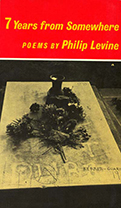 In the late 1980's at the University of Florida, I was introduced to many writers through a variety of creative writing and humanities courses. Of the poets I encountered, none resonated so deeply with me as did Philip Levine. The strength of this connection with his poetry has never faltered. In learning that he passed away earlier this year, we mark his passing by remembering some of his poems that were favorites. My first favorite poem by Philip Levine, introduced to me by Prof. Diane Stevenson in a freshman creative writing poetry class was "You Can Have It". This poem comes from the collection titled Seven Years from Somewhere published in 1979. There is a link to the poem here.
In the late 1980's at the University of Florida, I was introduced to many writers through a variety of creative writing and humanities courses. Of the poets I encountered, none resonated so deeply with me as did Philip Levine. The strength of this connection with his poetry has never faltered. In learning that he passed away earlier this year, we mark his passing by remembering some of his poems that were favorites. My first favorite poem by Philip Levine, introduced to me by Prof. Diane Stevenson in a freshman creative writing poetry class was "You Can Have It". This poem comes from the collection titled Seven Years from Somewhere published in 1979. There is a link to the poem here.
|
|
April 21, 2015
Philip Levine
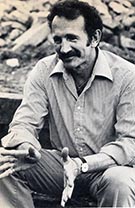 Today we present a quote by the late American poet, Philip Levine (January 10, 1928 - February 14, 2015).
Today we present a quote by the late American poet, Philip Levine (January 10, 1928 - February 14, 2015).
I know that the government in Washington is full of terrible people with terrible plans. They will murder people here and abroad to gain more power. Those who have dominated our country most of my adult life are interested in maintaining an empire, subjugating other people, enslaving them if need be, and finally killing those who protest so that wealthy and powerful Americans can go on enjoying their advantages over others. I'm not doing a thing about it. I'm not a man of action; It finally comes down to that. I'm not so profoundly moral that I can often overcome my fears of prison or torture or exile or poverty. I'm a contemplative person who goes in the corner and writes. What can we do? I guess we can hang on and encourage each other, dig in, protest in every peaceful way possible, and hope that people are better than they seem.
--Philip Levine
The Art of Poetry No. 39, Interview by Mona Simpson, Paris Review, No. 107, Summer 1988.
|
|
April 10, 2015
Cornelius Cardew
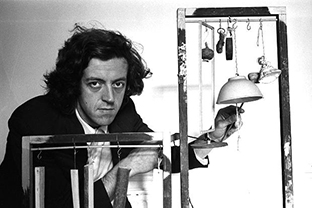 Today we present a quote by the English composer, Cornelius Cardew (1936-1981).
Today we present a quote by the English composer, Cornelius Cardew (1936-1981).
This kind of thing happens in improvisation. Two things running concurrently in haphazard fashion suddenly synchronise autonomously and sling you forcibly into a new phase... Connected with this is the proposition that improvisation cannot be rehearsed. Training is substituted for rehearsal, and a certain moral discipline is an essential part of this training.
--Cornelius Cardew
Towards an Ethic of Improvisation from "Treatise Handbook", Edition Peters, London & New York, 1971.
|
|
April 2, 2015
Two Poems by Stefan Themerson
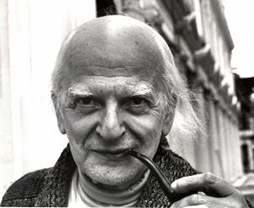 Today we feature a poem by Stefan Themerson (1910-1988), a Polish and later British poet, novelist, filmmaker, composer and philosopher. This poem is taken from Collected Poems posthumously published by Gaberbocchus Press of Amsterdam in 1998. An online Themerson archive exists.
Today we feature a poem by Stefan Themerson (1910-1988), a Polish and later British poet, novelist, filmmaker, composer and philosopher. This poem is taken from Collected Poems posthumously published by Gaberbocchus Press of Amsterdam in 1998. An online Themerson archive exists.
I am a priest...
I am a priest
I have my own religion
Nothing to do with any of yours.
I have one parishioner:
Myself.
But even he
Comes and goes as he likes
Not frightfully faithful.
I admire poets...
I admire poets who can put words into such a form
That you can almost take it in your fingers
And place it on a lady's head, like a tiara,
Or on an art historian's desk, like a paperweight.
Yes, I admire many things that I don't like.
|
|
January 6, 2015
Lê Quan Ninh
 Today we present a quote from Lê Quan Ninh (1961-), a French percussionist, on Nothing.
Today we present a quote from Lê Quan Ninh (1961-), a French percussionist, on Nothing.
After every performance, I might as well throw up my hands and shout: "Still nothing!!"...Maybe just the amount of time that passed, a time that lacks the quality of assault or fading away, a simple stretch of collective lived time that gets melded with my perception. So what exactly was I doing during all that time, with sounds? What took hold of me that in turn made me use them, make them appear, state them aloud, and then leave them behind in nothingness? What persuaded me to choose such an unproductive, useless activity?
--Lê Quan Ninh
Improvising Freely: The ABC's of an Experience, trans. Karen Houle, PS Guelph, 2014, p. 63.
|
|
November 30, 2014
Pope Francis
 The great danger in today's world, pervaded as it is by consumerism,
is the desolation and anguish born of a complacent yet covetous heart,
the feverish pursuit of frivolous pleasures, and a blunted conscience.
Whenever our interior life becomes caught up in its own interests and concerns,
there is no longer room for others, no place for the poor.
God's voice is no longer heard,
the quiet joy of his love is no longer felt,
and the desire to do good fades.
The great danger in today's world, pervaded as it is by consumerism,
is the desolation and anguish born of a complacent yet covetous heart,
the feverish pursuit of frivolous pleasures, and a blunted conscience.
Whenever our interior life becomes caught up in its own interests and concerns,
there is no longer room for others, no place for the poor.
God's voice is no longer heard,
the quiet joy of his love is no longer felt,
and the desire to do good fades.
--Pope Francis
Apostolic Exhortation: Evangelii Gaudium (Joy of the Gospel), November 24, 2013, English translation, paragraph 2, Vatican Press.
|
|
September 17, 2014
Harry Braverman
 Today we present a quote from Harry Braverman (1920-1976), an American Marxist, on the subject of the impact of the universal market on leisure.
Today we present a quote from Harry Braverman (1920-1976), an American Marxist, on the subject of the impact of the universal market on leisure.
In a society where labor power is purchased and sold, working time becomes sharply and antagonistically divided from non-working time, and the worker places an extraordinary value upon this "free" time, while on-the-job time is regarded as lost or wasted. Work ceases to be a natural function and becomes an extorted activity, and the antagonism to it expresses itself in a drive for the shortening of hours on the one side, and the popularity of labor-saving devices for the home, which the market hastens to supply, on the other. But the atrophy of the community and the sharp division from the natural environment leaves a void when it comes to the "free" hours. The filling of time away from the job also becomes dependent upon the market, which develops to an enormous degree those passive amusements, entertainments, and spectacles that suit the restricted circumstances of the city and are offered as substitutes for life itself. Since they become the means of filling all the hours of "free" time, they flow profusely from corporate institutions which have transformed every means of entertainment and "sport" into a production process for the enlargement of capital. By their very profusion, they cannot help but tend to a standard of mediocrity and vulgarity which debases popular taste, a result which is further guaranteed by the fact that the mass market has a powerful lowest-common-denominator effect because of the search for maximum profit. So enterprising is capital that even where effort is made by one or another section of the population to find a way to nature, sport, or art through personal activity and amateur of "underground" innovation, these activities are rapidly incorporated into the market so far as is possible.
--Harry Braverman
Labor and Monopoly Capital: The Degradation of Work in the Twentieth Century, Monthly Review Press, New York, 1974, pp. 278-9.
|
|
May 20, 2014
Lê Quan Ninh
 Today we present a quote from Lê Quan Ninh (1961-), a French percussionist, on the counter-intuitive time scale of improvisation.
Today we present a quote from Lê Quan Ninh (1961-), a French percussionist, on the counter-intuitive time scale of improvisation.
But it took time, I mean time spending is the thing, time spending. We have to practice, practice, practice, year after year, month after month something can appear, it takes time, it takes time. I said maybe in the panel, a composer can be really fast; usually people say "the improviser has a really fast..." because they can make an instant composition in ten minutes, for me that's absolutely wrong. "But the composer for the ten minutes he spent six months, that's too long." It is absolutely the contrary; six months is so short time, and an improviser needs maybe ten years to reach the same regions of dealing with the elements and a composer can do it very quickly, because he can see everything on the paper and he can go back and forth in the composition. An improviser to change something in him or her, it is so slow, it is very slow; that's why he needs a daily practice, a discipline. We talk about freedom and our risk our talk is always about the discipline of being free. It is really discipline.
--Lê Quan Ninh
Interview with Sevket Akinci, Michal Libera and Volkan Terzioglu, Istanbul, June 23, 2006.
full interview here.
|
|
May 14, 2014
Philip Levine
 Today we present a quote from Philip Levine (January 10, 1928-), an American Poet.
Today we present a quote from Philip Levine (January 10, 1928-), an American Poet.
As you will hear, I don't think anyone taught me how to read poetry or even why I should feel it necessary to read poetry at all, though some assured me that, without poetry, not only my life but everyone's life would be less worthy. At times I believed this; worse still I've said such things to undergrads who were trying to get their degrees in nursing, business administration and hay-seeding.
--Philip Levine
from A History of My Befuddlement
The Judith Lee Stronach Memorial Lectures on the Teaching of Poetry
The University of California, Berkeley, 2009, p. 1.
|
|
May 9, 2014
Joëlle Léandre
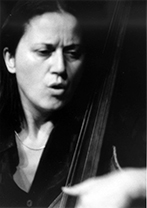 Today we present a quote from Joëlle Léandre (1951-), a French free-improvising bassist.
Today we present a quote from Joëlle Léandre (1951-), a French free-improvising bassist.
Improvisation is music of jubilation where the primary driving factor is incarnate liberty. I don't know who said: "A real improviser is someone who prepares for being unprepared." That's exactly how it is, it's so true. He's ready for anything. Instants that are unique. Fugitive, true, in the moment of their emission. Everything is in motion. Even clouds, ourselves, constantly. Our molecules dance, they're agitating continuously.
--Joëlle Léandre
from Solo. Conversations with Franck Médici
translated from the French by Jeffrey Grice
Kadima Collective, Israel, 2011, p. 66.
|
|
May 1, 2014
Elias Canetti
 Today we present a quote from Elias Canetti (1905-1994), a Bulgarian-born Swiss and British modernist novelist and Nobel laureate (1981).
Today we present a quote from Elias Canetti (1905-1994), a Bulgarian-born Swiss and British modernist novelist and Nobel laureate (1981).
But no mind ever grew fat on a diet of novels. The pleasure which they occasionally offer is far too heavily paid for: they undermine the finest characters. They teach us to think ourselves into other men's places. Thus we acquire a taste for change. The personality becomes dissolved in pleasing figments of imagination. The reader learns to understand every point of view. Willingly he yields himself to the pursuit of other people's goals and loses sight of his own. Novels are so many wedges which the novelist, an actor with his pen, inserts into the closed personality of the reader. The better he calculates the size of the wedge and the strength of the resistance, so much the more completely does he crack open the personality of his victim. Novels should be prohibited by the State.
--Elias Canetti
from Auto-da-Fé
translated from the German by C.V. Wedgwood
Stein and Day Publishers, New York, 1946, p. 42.
|
|
February 17, 2014
Yasushi Inoue
 Today we present a quote from Yasushi Inoue on the destiny of literary works.
Today we present a quote from Yasushi Inoue on the destiny of literary works.
Just as men are born under lucky or unlucky stars, so, too, literary works are more or less blessed by fortune.
Some arrive in the world perfectly formed; others are born sickly.
Certain works achieve celebrity, while others languish in shadows, condemned to huddle all their lives in an out-of-the-way corner.
Whether or not a work meets with success is to some extent a matter of caprice.
Works the author approves of are ignored, and vice versa.
The destinies of literary works are as fickle as those of men.
Among the works I have published, some have had the good fortune to be much discussed, while others were forgotten almost as soon as they saw the light of day.
--Yasushi Inoue
Tokyo, 1988
originally published as the preface to the 1988 edition of Bullfight
included as the Afterword in Bullfight
translated by Michael Emmerich
Pushkin Press, London, 2013, pp. 126-7.
|
|
November 5, 2013
Steve Lacy
 Today's quote comes from the American soprano saxophonist, Steve Lacy (July 23, 1934 - June 4, 2004).
Today's quote comes from the American soprano saxophonist, Steve Lacy (July 23, 1934 - June 4, 2004).
Q: What's your general attitude toward practice?
Lacy: It's what I was saying before about grappling: you have to really treat your instrument badly.
You have to really beat on it.
You have to hit on it and insist on certain things that it doesn't want to deal with.
You have to stay on some low notes until the instrument is crazy.
Another thing I would recommend to you is tight corner exercises where you limit what you're working on to just one or two notes
and you stay on it a long, long, long time.
You take a half step and you play this half step for a while.
Just go back and forth on this half step.
If you keep that up for a while it starts to get very boring.
When you get beyond the boredom, it starts to get interesting a little bit.
If you stay on it after that, you get into the realm of hallucinations and there's where the fun begins.
There's where the interval starts to get bigger and bigger and you start to get smaller and the interval gets bigger than you are.
You're a little person in this big interesting interval, which is a half-step really, and it's so big that it's incredible.
You're hallucinating.
You can do all kinds of things that you never dreamed of with that half-step.
It becomes a room and after an hour in this room, it's like a trip.
You have a rest and everything is transformed.
Your horn and all the elementals will never be the same.
Your ear is changed.
A trip like that changes your whole life.
Well, there's a thousand trips like that possible.
I would recommend that you start dealing with things like that if you're interested in digging what can be dug out.
Steve Lacy
from a 1988 interview with Kirk Silsbee
collected in Steve Lacy: Conversations
published by Duke University Press, 2006, p. 126.
|
|
July 17, 2013
Joseph Stiglitz
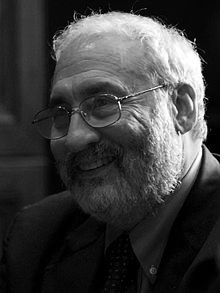 Today's quote comes from the American economist, Joseph Stiglitz.
Today's quote comes from the American economist, Joseph Stiglitz.
An individual's cognitive resources are limited.
The stress of not having enough money to meet urgent needs may actually impair the ability to take decisions that would help alleviate the situation.
The limited stock of cognitive resources is depleted and this can lead people to make irrational decisions.
Joseph Stiglitz
From The Price of Inequality
published by W.W. Norton & Company, 2012, p. 103.
|
|
June 5, 2013
Today we present a trio of brief quotes on the subject of purpose and individuality.
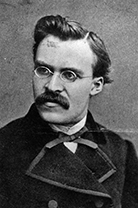 Friedrich Nietzsche
Friedrich Nietzsche
To forget one's purpose is the commonest form of stupidity.
--Friedrich Nietzsche
from Human, All too Human, (Menschliches, Allzumenschliches: Ein Buch für freie Geister), Part II: Assorted Opinions and Maxims (Vermischte Meinungen und Sprüche), II.206, 1879.
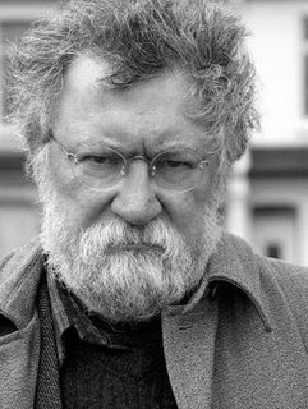 Evan Parker
Evan Parker
The great tragedy of our times is that too many people spend their lives doing work that is contrary to their own natures.
--Evan Parker
from Music and the Creative Spirit: Innovators in Jazz, Improvisation and the Avant-Garde by Lloyd Peterson
Scarecrow Press, Lanham, Maryland, 2006, p. 242.
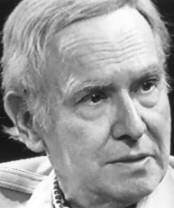 Charles Musès
Charles Musès
In fact, our greatest contribution to others, and to our self-development as well, lies in the direction of developing precisely along the lines where our greatest uniqueness lies.
--Charles Musès
from Destiny and Control in Human Systems
Kluwer-Nijhoff Publishing, Boston, 1985, p. 171.
|
|
May 21, 2013
Yi Mun Yol
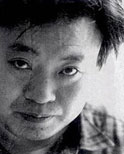 Today's quote comes from the Korean author, Yi Mun Yol.
Today's quote comes from the Korean author, Yi Mun Yol.
Small uses are always evident, great uses never.
A gimlet is made to pierce holes, a cord is spun to bind things.
But there's no easy explanation for why the Creator produced the Universe.
Does that mean that the Universe is useless?
Yi Mun Yol
From from the novelThe Poet
published by The Harvill Press, 1995.
|
|
May 3, 2013
Donald Barthelme
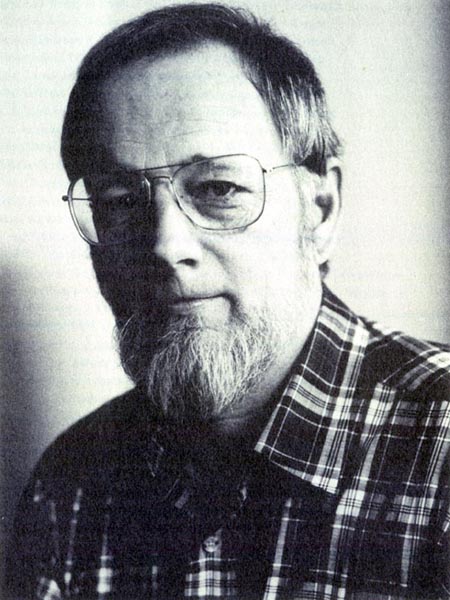 Today's quote comes from the American author, Donald Barthelme.
Today's quote comes from the American author, Donald Barthelme.
I don't believe that we are what we do although many thinkers argue otherwise.
I believe that what we do is, very often, a poor approximation of what we are--an
imperfect manifestation of a much better totality.
Donald Barthelme
From from the short story Jaws
collected in Forty Stories
published by G. P. Putnam's Sons, 1987.
|
|
April 22, 2013
George Lewis
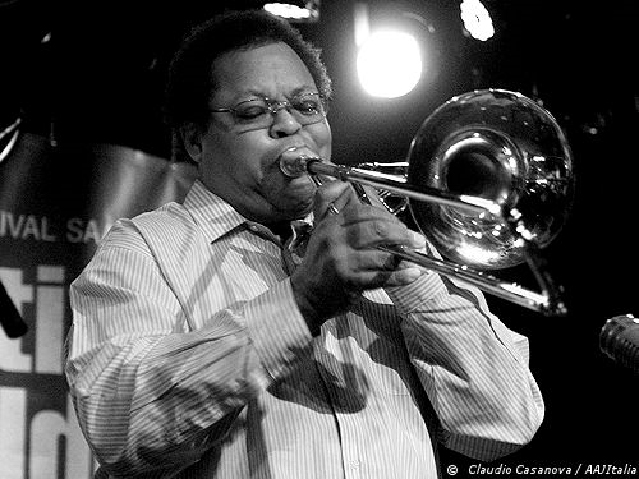 Today's quote comes from trombonist & composer, George Lewis.
Today's quote comes from trombonist & composer, George Lewis.
The challenge is for more and more people to recognize the importance of that birthright.
It's different from saying that everyone is an artist, because there are lots of
people who are not artists who are creative, and creativity is not just one tiny thing.
But you don't want to commodify it to be the province of an official artist who gets written
about in newspapers and all of that. We want to be able to recognize the ubiquity of
creativity as a means of recognizing its crucial nature to our experience as human
beings on this planet, and maybe on the next planet (laughs).
George Lewis
From “Music and the Creative Spirit: Innovators in Jazz, Improvisation and the Avant-Garde” by Lloyd Peterson,
Scarecrow Press, Lanham, Maryland, 2006, p. 155.
|
|
April 12, 2013
Ovid
 Today's quote comes from Ovid.
Today's quote comes from Ovid.
But calm reflection will show that destiny was to blame for Actaeon’s misfortunes,
not any guilt on his own part; for there is nothing sinful in losing one’s way.
The Metamorphoses of Ovid, Book III, completed AD 8, trans. Mary M. Innes, Penguin Books, London, 1955.
|
|
March 22, 2013
Peter Brötzmann
 Today's quote comes from saxophonist, Peter Brötzmann.
Today's quote comes from saxophonist, Peter Brötzmann.
After over thirty years, it may look and sound a little bit
different, but in the end, I think my inspiration still comes from the
same place. When I was a young man, I thought I could change the
world. I was angry. And now, after all of these years and all that we
may have done to try and make things better, it has done nothing! We
are just as foolish as we have always been. But that shouldn’t be a
resignation. We have reason to be optimistic and we must try to make
a difference.
Peter Brötzmann
From “Music and the Creative Spirit: Innovators in Jazz, Improvisation and the Avant-Garde” by Lloyd Peterson,
Scarecrow Press, Lanham, Maryland, 2006, p. 33.
|
|
March 15, 2013
Derek Bailey
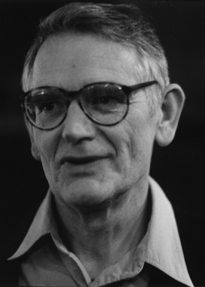 The quote to contemplate for today comes from a grandfather of non-idiomatic improvisation, the late guitarist, Derek Bailey.
The quote to contemplate for today comes from a grandfather of non-idiomatic improvisation, the late guitarist, Derek Bailey.
In so far as I listen with interest to a record, it’s usually to figure out how it was arrived at.
The musical end product is where interest starts to flag. It’s a bit like jigsaw puzzles.
Emptied out of the box, there’s a heap of pieces, all shapes, sizes and colours,
in themselves attractive and could add up to anything--intriguing.
Figuring out how to put them together can be interesting,
but what you finish up with as often as not is a picture of unsurpassed banality. Music’s like that.
Derek Bailey
From “Derek Bailey and the Story of Free Improvisation” by Ben Watson,
Verso, London, 2004, p. 440.
|
|
January 11, 2013
Mark Rothko
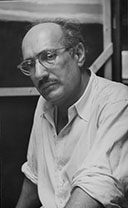 It is really one of the most serious faults which can be found with the whole conception
of democracy, that its cultural function must move on the basis of the common denominator.
Such a point of view indeed would make a mess of all of the values which we have
developed for examining works of art. It would address one end of education in that it
would consider that culture which was available to everyone, but in that achievement it
would eliminate culture itself.
It is really one of the most serious faults which can be found with the whole conception
of democracy, that its cultural function must move on the basis of the common denominator.
Such a point of view indeed would make a mess of all of the values which we have
developed for examining works of art. It would address one end of education in that it
would consider that culture which was available to everyone, but in that achievement it
would eliminate culture itself.
This is surely the death of all thought.
This quote is taken from "The Artist’s Reality: Philosophies of Art" by Mark Rothko,
written 1940-1 and published posthumously in 2004 by Yale University Press, pp.126-7.
|
|
January 4, 2013
Albert Camus
 Contrary to the current presumption, if there is any man who has no right to solitude, it is the artist.
Art cannot be a monologue.
When the most solitary and least famous artist appeals to posterity, he is merely reaffirming his fundamental vocation.
Considering a dialogue with deaf or inattentive contemporaries to be impossible, he appeals to a more far-reaching dialogue with the generations to come.
But in order to speak about all and to all, one has to speak of what all know and of the reality common to us all.
The sea, rains, necessity, desire, the struggle against death--these are the things that unite us all.
We resemble one another in what we see together, in what we suffer together.
Dreams change from individual to individual, but the reality of the world is common to us all.
Contrary to the current presumption, if there is any man who has no right to solitude, it is the artist.
Art cannot be a monologue.
When the most solitary and least famous artist appeals to posterity, he is merely reaffirming his fundamental vocation.
Considering a dialogue with deaf or inattentive contemporaries to be impossible, he appeals to a more far-reaching dialogue with the generations to come.
But in order to speak about all and to all, one has to speak of what all know and of the reality common to us all.
The sea, rains, necessity, desire, the struggle against death--these are the things that unite us all.
We resemble one another in what we see together, in what we suffer together.
Dreams change from individual to individual, but the reality of the world is common to us all.
This quote is taken from a lecture titled "Create Dangerously" delivered by Albert Camus on December 14, 1957 at the University of Uppsala in Sweden.
The full text of the lecture is available here.
|
|
|
|
|

